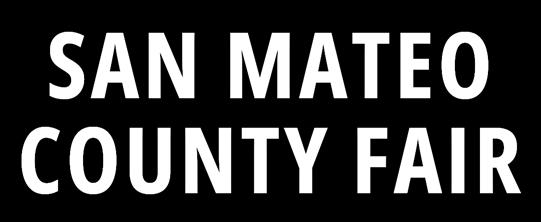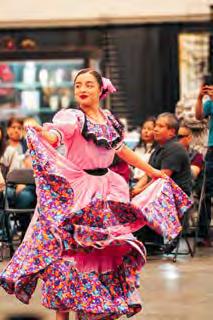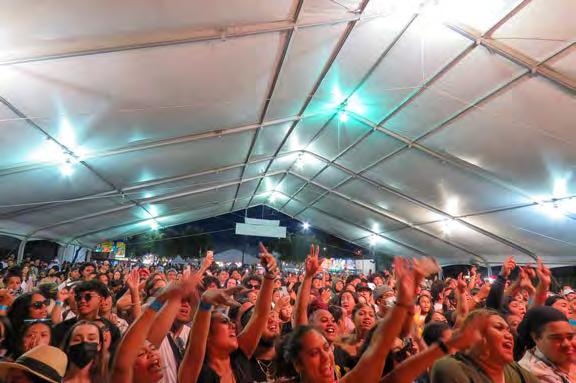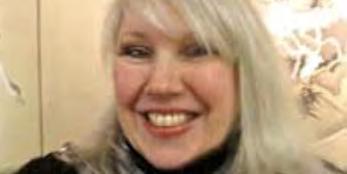

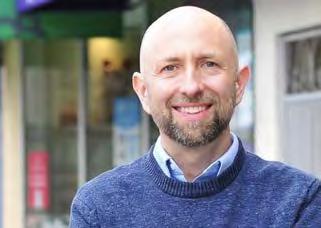




by John Ferrannini
The campaign to recall gay District 4 Supervisor Joel Engardio is likely to make it to the ballot this year. The San Francisco Department of Elections confirmed to the Bay Area Reporter that 99.3% of a random sample of the signatures submitted last week were valid.
The recall campaign was sparked by Engardio’s support of Proposition K, which voters passed last November to permanently close a portion of the Great Highway to vehicle traffic. While the measure was approved by voters citywide, those in District 4 largely cast ballots against Prop K and were critical of Engardio’s support for it.
Matthew Selby, the election department’s campaign services manager and custodian of records, stated that his department is in the process of verifying all of the signatures, which can take up to 60 business days but will likely be concluded sooner than that.
Otto Pippenger, a field director for the recall, stated, “It’s gratifying to see that the hard work of both collecting and pre-validating is appearing to conform to our intent.”
“We aimed to have as close to a 100% validity rate as possible,” he stated. “We’ve tried to save the DoE as much unnecessary work as possible. At the end of the day, it’s in their hands, but the truth is that we expect the remainder of the count to show a very similar percentage to what we’ve seen in the initial sampling. A lot of very good people put a lot of volunteer time and effort in to meet our threshold of quality, and my colleagues and I are honored to have been able to help D4 voters utilize their democratic rights.”
In a statement, Engardio discussed his efforts to stay in office.
“Making change is hard and I understand the concerns people have. I’ve knocked on thousands of doors in recent months, visited every small business in the Sunset, and met with constituents at community meetings and neighborhood social events,” Engardio stated.
See page 10 >>
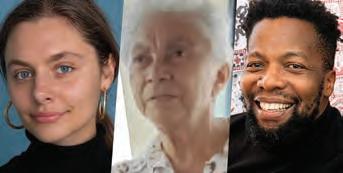
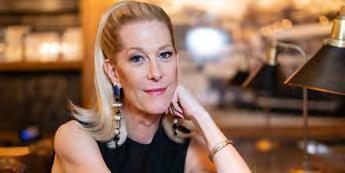
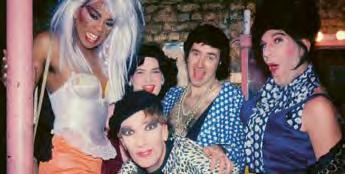
by John Ferrannini
The San Francisco Community College District Board of Trustees has appointed a queer and nonbinary person as its next permanent chancellor. The decision is expected to be ratified at the board’s May 29 meeting.
After a long search process culminating in campus visits by finalists in mid-March, the appointment of Carlos O. Cortez, Ph.D., the former chancellor of the San Diego Community College District, will be voted on by the board Thursday for a tenure starting July 1, according to a news release.
“I am beyond grateful for the opportunity to serve City College of San Francisco as the college’s new chancellor,” Cortez stated. “I have deep love for San Francisco and the Bay Area. I believe in the capacity of all students to succeed. I pledge to work diligently to create the conditions necessary for all stakeholders to thrive. I am aware of the challenges and opportunities that lie ahead for CCSF. I believe the college is uniquely positioned to embark on a renaissance. The future is bright for CCSF.”
Cortez spoke with the Bay Area Reporter right before his campus visit earlier this year. The 50-yearold, who was the first chancellor in the state’s community college system to identify as queer and nonbinary, is an alum of the University of Southern California.
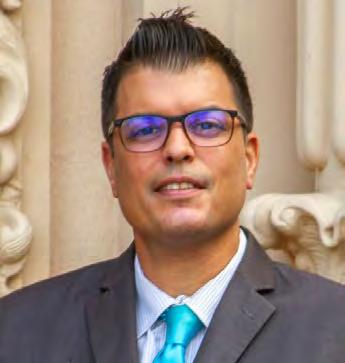

cerned I was changing too quickly.”
After finishing his master’s at Georgetown University, Cortez returned to the Golden State. He said he set his eyes on City College because, “I appreciate the population the college serves, the mission of the institution and believe it has an important history that can’t be understated.”
Cortez said he’d be a good addition because he has helped facilitate communication between different stakeholders, such as the academic senate and faculty groups. He noted that historic relations between administration and the faculty union at City College needed some improvement.
Anita Martinez, the president of the board, stated that Cortez is ideally suited to lead the college, which is the only one in the district.

Cortez said that he’d seen the position available several times and decided to give it a shot. He’d spent some time as an undergraduate in the Bay Area in the 1990s.
“[UC] Berkeley undergrad helped awaken my own queer identity,” Cortez said. “My folks made me go back to the East Coast, because they were con-






compiled by Cynthia Laird
S“I share with the community a positive outlook for the CCSF’s future,” Martinez stated. “Cortez has a proven track record of success in academic innovation, fundraising, student success, and community engagement. As a former City College [English as a second language] teacher, I am excited about the commitment he has to student success and to programs for new Americans, noncredit workforce development, and older adults.”

Cortez would be the district’s fifth permanent head since 2012. The San Francisco Chronicle reported his career has not been without controversy. See page 11 >>



anta Cruz Pride will hold its 50th annual parade and festival Sunday, June 1. It’s just one of many smaller parades, festivals, and other events that will usher in Pride Month.
Rob Darrow, chair of Santa Cruz Pride, stated that the annual event has brought nearly 5,000 people to downtown Santa Cruz.
The Los Angeles Blade covers Los Angeles and California news, politics, opinion, arts and entertainment and features national and international coverage from the Blade’s award-winning reporting team. Be part of this exciting publication serving LGBT Los Angeles from the team behind the Washington Blade, the nation’s first LGBT newspaper. From the freeway to the Beltway we’ve got you covered.
“The 50th anniversary of Santa Cruz Pride is a milestone in history for the visibility and celebration of a vibrant LGBTQ+ community unlike any across the country,” he wrote in a background piece. “It is a time to celebrate all people and allies across the county.”
This year’s theme is “Riding the Waves of Progress – No Going Back.”
Darrow pointed out that in 1975, Santa Cruz became the first smaller city to convene a Pride in the nation.
“The Stonewall riots took place in New York in June 1969 when LGBTQ+ people fought back against police harassment,” he noted.
“Many historians consider this to be the beginning of the modern LGBTQ+ rights movement. New York, San Francisco, Los Angeles, and Chicago held the first official ‘Pride’ events in 1970. Since then, Pride is celebrated each year in cities across the world to commemorate the Stonewall riots.”

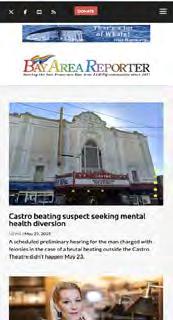
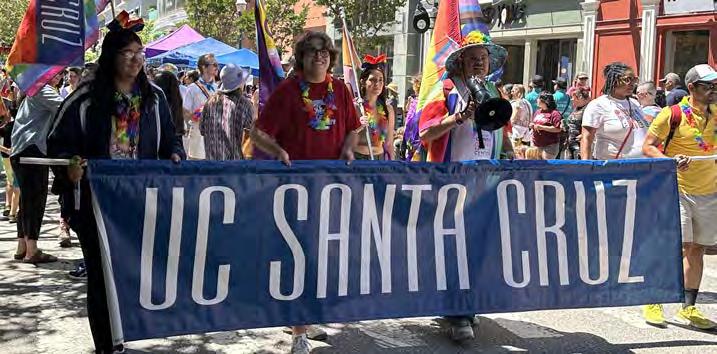
Darrow stated that in addition to the Stonewall anniversary, Santa Cruz Pride will celebrate the rich LGBTQ history, culture, and people across the county.
The broader Santa Cruz County community has contributed to a thriving LGBTQ+ community, including a 1992 Santa Cruz City Council anti-discrimination employment and housing ordinance based on gender identity and sexual orientation that was one of the first in the state, Darrow noted.
“In June 2024, the Santa Cruz County Board of Supervisors passed a resolution that designated the county as a sanctuary county for transgender and nonbinary people and, in January 2025, the supervisors passed a resolution affirming that the county is a safe place for LGBTQ+ people,” Darrow stated.
“Santa Cruz County is one of the few places in the country where the LGBTQ+ community is integral to the success, growth, and culture of the region.”
See page 10 >>

by Cynthia Laird
Victoria Brownworth, a lesbian who was the longtime television columnist for the Bay Area Reporter and contributed to other publications, died May 22. She was 69.
Ms. Brownworth had long lived with multiple sclerosis and had battled cancer for many years. She had been hospitalized in Philadelphia in recent weeks, according to posts on her X feed that were written by a close friend.
With an astute eye toward entertainment, Ms. Brownworth penned the B.A.R.’s Lavender Tube TV column for three decades. Often, her writing veered into the political.
“One of the great pleasures of my editorial job of the past five years was working on Victoria’s twice-monthly Lavender Tube column, which she had been writing for decades,” stated B.A.R. arts and nightlife editor Jim Provenzano. “We’d like to volley back-and-forth emails over TV show suggestions.
“Toward the end of her illness, she
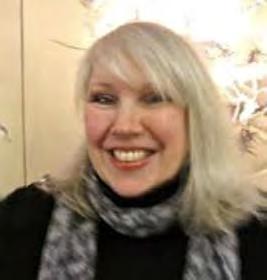
was writing her column from a hospital bed, determined not to miss any deadlines,” he added. “Her perspectives on television and other topics will be sorely missed. She was a true pioneer in journalism.”
Her last B.A.R. column was published April 29. It looked at the latest season of “Hacks” and Martha Stewart’s cooking show.
“We have been a fan of Martha Stewart’s for decades,” Ms. Brownworth wrote. “A true icon, Martha Stewart has done it all. She’s built a multimillion brand, hosted multiple TV series, published a raft of bestselling books, published Martha Stewart Living magazine, created an aura of beauty, perfect food from salads to desserts and built gardens galore. Oh, and she also makes stuff.”
She ended the column with coverage of Pope Francis’ death.
“Francis’ stance on LGBTQ people outraged many in the Church hierarchy, but Francis brought in Jesuit priest Father James Martin as his emissary to the community,” Ms. Brownworth wrote.
“Martin told ABC anchor David Muir that when Martin asked Francis what he could do for him, Francis said to keep ministering as he was.
“A man of grace, compassion, and kindness who was aggressively progressive on myriad issues including the environment, immigrants, and the wars in Gaza and Ukraine, Francis was dedicated to the poor and the vulnerable.
He said Donald Trump could not be a Christian while deporting people.
“We shall not see his like again. So, for the sacred and the profane, you know you really must stay tuned.”
Also an author, she won the Lambda Literary Award for Lesbian Mystery for her 2016 novel, “Ordinary Mayhem,” and was a five-time finalist in other categories.
Mark Segal, a gay man who is publisher of Philadelphia Gay News, noted that Ms. Brownworth also wrote for his LGBTQ newspaper.
“Victoria had been part of the Philadelphia Gay News family for decades,” Segal wrote on Facebook. “She had a gift for writing. She was fearless in her reporting and always looking for the next unique story. I remember she came to me in the 1980s and said, ‘You might not go for this, but how about a story on lesbian nuns?’ That story ended up winning numerous awards.”
In addition to writing entertainment articles, Ms. Brownworth also contributed to PGN’s LGBTQ Histo-
ry Month program, in which several publications, including the B.A.R., shared stories during October.
In 2023, she authored a piece about how the National Organization for Women purged lesbians from its ranks in its early years even as it was co-founded by Pauli Murray, a gender-nonconforming lesbian; Betty Friedan, and Aileen Hernandez.
“NOW was itself a groundbreaking organization, which made Friedan’s purging of lesbians from that organization in 1970 – after calling them the “lavender menace” in an interview with the New York Times Magazine – significant on myriad levels,” Ms. Brownworth wrote. “That action effectively separated lesbians from mainstream feminism, just as they had been separated by gender from the decidedly male gay liberation movement.”
Ms. Brownworth’s beloved wife, Maddy Gold, died of cancer in 2022. t
by Cynthia Laird
Alan Wayne Martinez, a gay man and architect who was involved in San Francisco historic preservation efforts, has died, friends and family members said. Mr. Martinez was 69.
His brother, Richard Martinez, told the Bay Area Reporter May 22 that Mr. Martinez was found deceased in his bed in his San Francisco home the week of April 21. He did not have an exact date of death pending obtaining a death certificate, he said.
Richard Martinez said his brother, who had long lived with AIDS, tested positive for COVID for the first time in February. While he had later tested negative, he was still not back to normal.
Anne Cervantes, a straight ally who was a longtime friend and colleague, stated that she last spoke to Mr. Martinez on April 20, Easter Sunday.
“On Easter Sunday, he sent me a link to an Easter mass at a Portuguese church in San Jose he was obsessed with the architecture,” Cervantes wrote in an email.
Over his career, Mr. Martinez served on the San Francisco Historic Preservation Advisory Board, the San Francisco Historic Preservation Commission, and the Historic Preservation Fund Committee, according to Cervantes, who founded Cervantes Design Associates Inc.
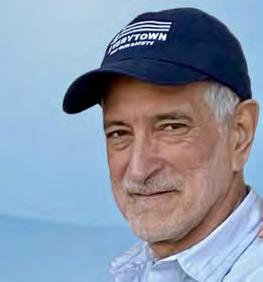
and wrote up a memorial that was submitted to the Historic Preservation Commission members, and gay San Francisco Board of Supervisors President Rafael Mandelman’s office.
Cervantes said she would miss her friend.
“We would call each other weekly or sometimes multiple times, depending where our historical research took us,” Cervantes wrote in an email. “He was always coming up odd historical facts. As colleagues, he consulted with me on architecture issues and how to approach to find a resolution.
“I am sad because I can’t call him on a new discovery ... so now I look to the sky to have conversations with him,” she added.
Mr. Martinez was involved in
preservation of LGBTQ spaces.
Back in the late 1990s, his brother said that he served as vice president


of Friends of 1800, the group that
wanted the San Francisco LGBT Community Center to keep the historic Queen Anne Victorian that it initially wanted to demolish to build the center. The Fallon Building, which survived the 1906 San Francisco earthquake and fire, was incorporated into the design of the center after it was designated a city landmark by the San Francisco Board of Supervisors. The community center withdrew its opposition after negotiations with Friends of 1800 and San Francisco Heritage Foundation, according to an online history of the friends group.
Cervantes’ tribute stated that Mr. Martinez’s “intellectual pursuits were deeply enriched by his admiration for Hannah Arendt, the renowned historian and philosopher.”
“Her profound examinations of human nature, politics, and society resonated with Alan’s own explorations of architecture and preservation,” Cervantes wrote. “He often drew inspiration from her writings, integrating her philosophical insights into his designs and dialogues.
For Alan, architecture was more than a physical structure; it was a reflection of humanity’s complexities, a theme he believed Arendt eloquent ly captured in her work.”
A business owner for 37 years at Alan Martinez Architect Inc., and a licensed architect for 40, Mr. Martinez brought insight to every project, Cervantes stated. He was a 1977 graduate
of UC Berkeley’s College of Environmental Design, noted Cervantes.
During his service on San Francisco preservation bodies, Mr. Martinez “was instrumental in safeguarding landmarks and cultural sites, ensuring they endured as living testaments to the city’s diverse heritage,” stated Cervantes.
Among his notable achievements, Mr. Martinez co-authored with fellow Historic Preservation Commissioner Diane Matsuda a resolution to adopt social heritage resources as part of the planning department’s context statements. It was, Cervantes explained, “a groundbreaking step in recognizing the cultural layers of urban spaces.”
Mr. Martinez also played a pivotal role as one of the co-authors of the San Francisco City Wide Pan Latino Context Statement and was deeply involved in the landmarking of the Carnaval and Chata mural, stated Cervantes.
He was also a champion of Portuguese history. “He often spoke of the lessons that could be learned from the Portuguese approach to preservation, and this passion for this cultural heritage was reflected in his work, discussions, and endeavors to integrate its ethos into the urban fabric of San Francisco,” Cervantes wrote in her memoriam.
Family tragedy
Richard Martinez said that his son, Christopher Ross Michaels-
Martinez, was among those killed by a gunman in a mass shooting in Isla Vista, near the UC Santa Barbara campus, on May 23, 2014. Mr. Martinez wrote about his nephew, a college sophomore, in a guest opinion in the B.A.R. several weeks later. “Years ago, I thought that someday I would have a niece who I would play dolls with and have long talks with about her boyfriends,” Mr. Martinez wrote. “Instead, I got a nephew, Chris, who played take-no-prisoners football and ambidextrous basketball.” But he grew close to his nephew.
“I was the uncle who let him do and think about the weird stuff,” Mr. Martinez wrote. “I got to show him around the Alhambra and explain to him how the architecture of San Carlo alle Quattro Fontane worked. We talked about Cicero’s essays and Roman history. And he knew that I had AIDS and about my political activity. Chris wrote part of his college application about me, about how much he admired me. I was kind of stunned. To have the experience, for someone like me who grew up queer and in mortal fear of jocks, to have this gentle resolute young man, my nephew, admire me ...”
Cervantes said that Mr. Martinez’s legacy will continue to inspire.
“He was a friend of history, a steward of preservation, and a tireless advocate for the stories that buildings and landscapes could tell,” she wrote. A memorial for Mr. Martinez is planned, but a date has not been set.t
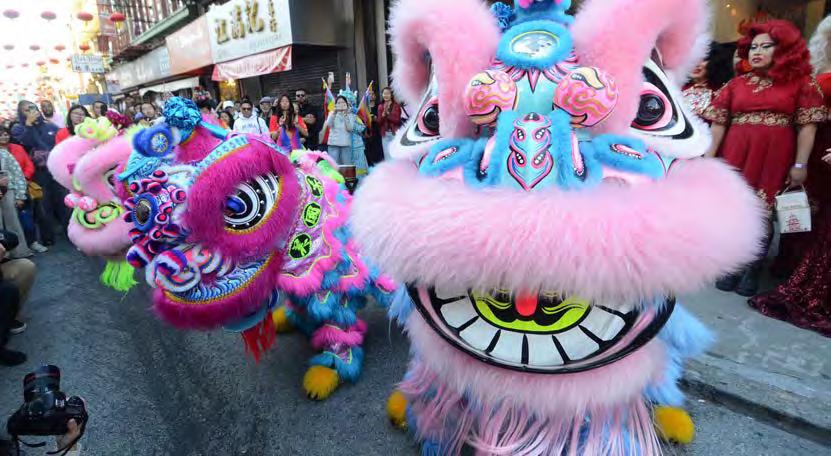
by John Ferrannini
Afederal judge in Oakland didn’t seem impressed by the justice department’s arguments as it pressed for the legality of three of President Donald Trump’s executive orders surrounding diversity, equity, and inclusion programs; equity-related grants; and gender identity. The judge is expected to issue a ruling in a couple of weeks.
As the Bay Area Reporter previously reported, LGBTQ and HIV/AIDS nonprofits, including the San Francisco AIDS Foundation and the San Francisco Community Health Center, filed suit after they acknowledged they’d received stop-work orders or termination notices for federal funds as a result of the orders.
Plaintiffs asked Judge Jon S. Tigar of the Northern District of California for a preliminary injunction to block the implementation of the orders, which threaten cuts to the nine nonprofit organizations across the United States.
Specifically, the suit challenges executive order No. 14168, which states that, “It is the policy of the United States to recognize two sexes, male and female” and defines sex as “an individual’s immutable biological classification” and not a synonym for gender identity. This order on gender identity also prohibits federal contractors and grantees from recognizing and respecting their identities or advocating for their civil rights. The lawsuit also challenges executive orders Nos. 14151 and 14173, which terminate equity-related grants and prohibit federal contractors and grantees from employing diversity, equity, inclusion, and accessibility principles in their work.
The lawsuit came after federal agencies sent notices terminating federal funding to organizations serving transgender people and to entities whose work could be described as “equityrelated” because they devote resources to underserved communities, address health disparities, or work to overcome systemic racism, sexism, or anti-LGBTQ bias. Some already have experienced temporary difficulties accessing their federal funds.
The other plaintiffs are the San Francisco-based GLBT Historical Society; the Los Angeles LGBT Center; Baltimore Safe Haven; FORGE Wisconsin; the BradburySullivan Community Center in Allentown, Pennsylvania; the New York City LGBT Community Center; and Prisma Community Care in Phoenix.
Tyler TerMeer, Ph.D., a gay man who is the CEO of SFAF, told the B.A.R., “Today, we stood up in defense of our trans community members, our staff, and our ability to lead with equity and justice at the heart of our mission. San Francisco AIDS Foundation refuses to be silenced or sidelined by this administration’s attempt to dismantle civil rights under the guise of policy.”
Arguing for the plaintiffs, attorney Camilla B. Taylor of Lambda Legal Defense and Education Fund said that the orders violate freedom of speech by limiting what federal contractors can say.
“With respect to speech, the three executive orders target plaintiffs based on their viewpoints in an attempt to chill expression,” Taylor said.
Asked Tigar, “Is that because they [plaintiffs] could reasonably conclude that the government thinks those actions are illegal, or because they have no way of knowing if the government considers those illegal, or something else.”
Answered Taylor, “Both, your honor.”
Taylor went further and said even if her clients were promoting DEI in non-federally-funded programs but in ways that went against the order, speech would still be chilled.
“Even if what plaintiffs are doing is promoting unlawful DEI activities, that is protected First Amendment activity –unless it arises to the level of incitement,” Taylor said.
“Plaintiffs themselves tell us they have reasonably self-censored and their speech has been chilled outside these government-funded programs.”
To give an example, Baltimore Safe
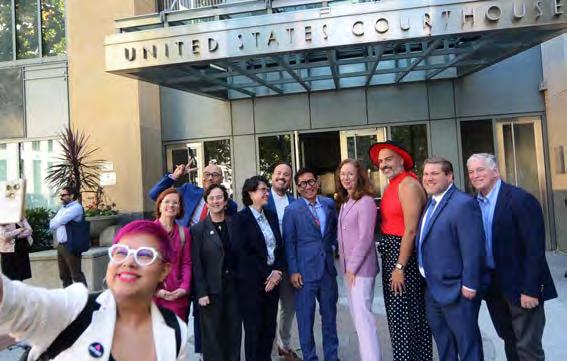
Haven took the names “gender affirming and sexual wellness” out of the name of its clinic, “to eliminate the potential loss of federal funding,” Taylor said. “Most key is what the New York City LGBT Center said, which is that complying with the gender order would dismantle its very identity – rendering it incapable of serving the community it was created to support.”
As for that order on gender identity,
Taylor quoted prior case law in saying, “One cannot express discrimination more directly, than to pronounce a policy that the group to which the policy is directed does not exist.”
Tigar grilled DOJ trial attorney Pardis Gheibi over what specifically would cause an agency to lose money because it was out of compliance with the orders.
Asked Tigar, “For example, would referring to someone, a client, perhaps, or
an agency employee, by a pronoun other than Mr., Mrs., Miss, or Ms. promote gender ideology?”
Answered Gheibi, “I want to make something clear. Now plaintiffs are asserting that just because their entity promotes gender ideology, they’ll lose all funds, but that’s not what the executive order says.”
Interrupted Tigar, “Sorry, madam [court] reporter. Can you read my question back?”
The court reporter read the question again.
Answered Gheibi, “Under the executive order, yes, but that does not mean they automatically lose funding.”
Gheibi argued that the order means funding would be cut to specific programs that promote gender ideology, not entire agencies if there is promotion of gender ideology elsewhere in the agency. She argued, “Plaintiffs are free to have equity-related programming all they want. The question here is, ‘Is it the government that’s paying for it.?”
Asked Tigar, “What if an agency trained its employees to ask clients what pronouns they use?”
Answered Gheibi, “Yes, it would promote gender ideology, but again, is there [federal] funding going to it?”
Gheibi couldn’t name an example of a Biden administration executive action
that promoted unlawful DEI programs, though she did say a policy giving favorable treatment to minority-owned businesses would be an example that would run against anti-discrimination laws.
A ruling is expected in a couple of weeks, a Lambda Legal spokesperson said after the hearing.
Lambda Legal HIV Project Director Jose Abrigo stated, “We demonstrated the existential threat posed by these orders, putting these organizations at risk of closing their doors and depriving thousands of people of critical services.”
“We asked the court to grant a preliminary injunction to block the implementation of these orders, which endanger the health and safety of many people, denying HIV medication and prevention services, housing to vulnerable communities, mental health services, health care for transgender people, and so much more,” Abrigo stated. “An injunction until the lawsuit is resolved would help them keep their doors open to continue to provide life-saving services.”
Abrigo stated that because the nonprofits offer “a lifeline to vulnerable people,” that “defunding them and forcing them to repudiate the existence of transgender people and eliminate all equity-related work discriminates against
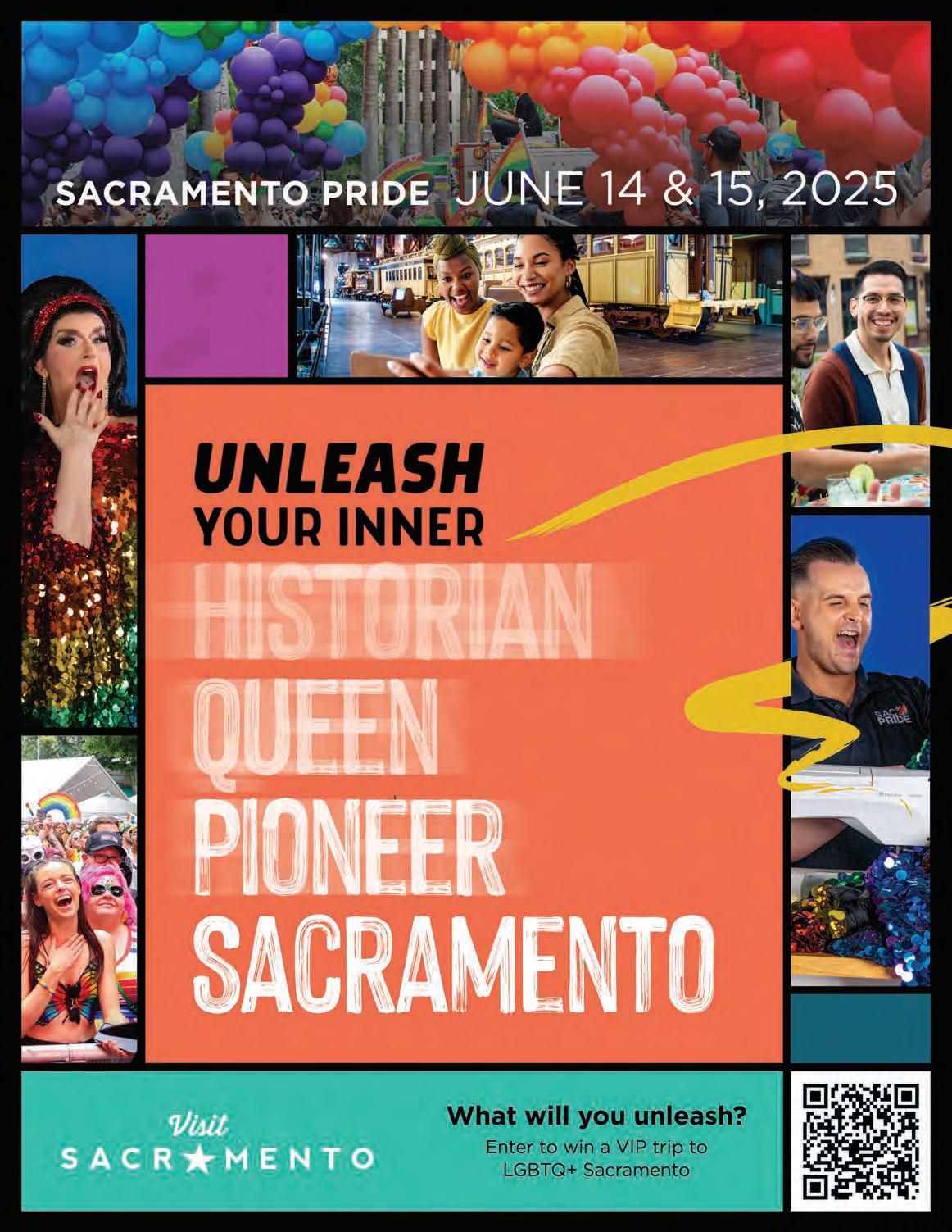
by Matthew S. Bajko
Thirty-three years ago, Gloria Careaga helped launch Mexican lesbian organization El clóset de Sor Juana, growing it into one of the country’s most influential LGBTQ nonprofits until its closure in 2023. The university professor also founded several other prominent LGBTIQ+ advocacy organizations, such as the Arcoíris Foundation.
At age 78, the out and proud lesbian has been working to draw attention to the needs of LGBTQ elders across Latin America. It hasn’t been easy, Careaga told the Bay Area Reporter during a recent video interview.
“Support for elders, LGBTQ elders, there are no reflections, no spaces. We have been trying,” said Careaga, who grew up in Guadalajara and now calls Mexico City home.
Nearly 9,500 miles away in the coastal Kenyan town of Kilifi, Kevin Mwachiro is working to bring visibility to queer and trans older adults in Eastern Africa. A gay man who authored the 2024 book “We’ve Been Here,” a collection of stories from out Kenyans over the age of 50, Mwachiro also cofounded the Out Film Festival based in Nairobi, the first LGBTIQ+ film festival in that part of the African continent.

“The book was received well here in Kenya. A lot of people don’t know queer folk over the age of 45 or know their stories,” said Mwachiro, 52, while speaking by video this spring with the B.A.R.
The two LGBTQ leaders are among the activists who are featured in the Global Storytelling Archive launched several years ago by SAGE, the U.S. based organization that advocates for
LGBTQ+ older people. Beginning in 2012, it began collecting the stories of dozens of queer and trans elders from around the world to archive them for posterity and inspire current and future generations of LGBTQ people and their allies.
Done in collaboration with other nonprofits and activists from across the globe, it is the first archival effort documenting the lives of LGBTIQ+
elders to be undertaken on an international scale, according to Hannah Yore, SAGE’s former director of international programs.
“This is currently the United Nations Decade on Healthy Aging. We were trying to make sure LGBTQIA older adults are considered around conversations on population aging and demographic shifts,” Yore noted during a phone interview with the B.A.R. about the archival project.
Yore, 31, a lesbian based in Brooklyn, New York who works as a palliative care and end-of-life doula, was hired on by SAGE in 2021 just as the U.N. aging decade kicked off (it officially runs through 2030). Just as the nonprofit was rolling out its global archival project this winter, Yore was let go from SAGE after the Trump administration cut off its federal funding for its overseas work.
(It joined three other national nonprofits that filed a federal lawsuit aimed at unfreezing their federal contracts.)
“It really undermines the trust building and international cooperation we have built with folks. This really was a first-of-
its-kind project, and we are losing the data and relationships built on that trust,” contended Yore. “I can’t overstate how much it takes to develop a strategy for this type of work and sustain it in a resource-limited environment.”
It was a particularly insulting decision by the Trump White House, added Yore, since SAGE had just had its contract with the U.S. Department of State extended through 2026 to continue its international programs. She had been planning to move from a country-based perspective and scale up to a regional focus in different parts of the world, though Yore noted many LGBTQ elders no matter their home country are dealing with issues of isolation, loneliness, and financial insecurity. They also have a through line of being resilient and finding joy in life despite the odds they had to overcome, experiences that need to be preserved and shared with younger LGBTQ folks and others, contended Yore.
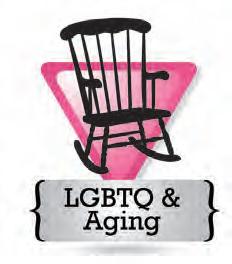
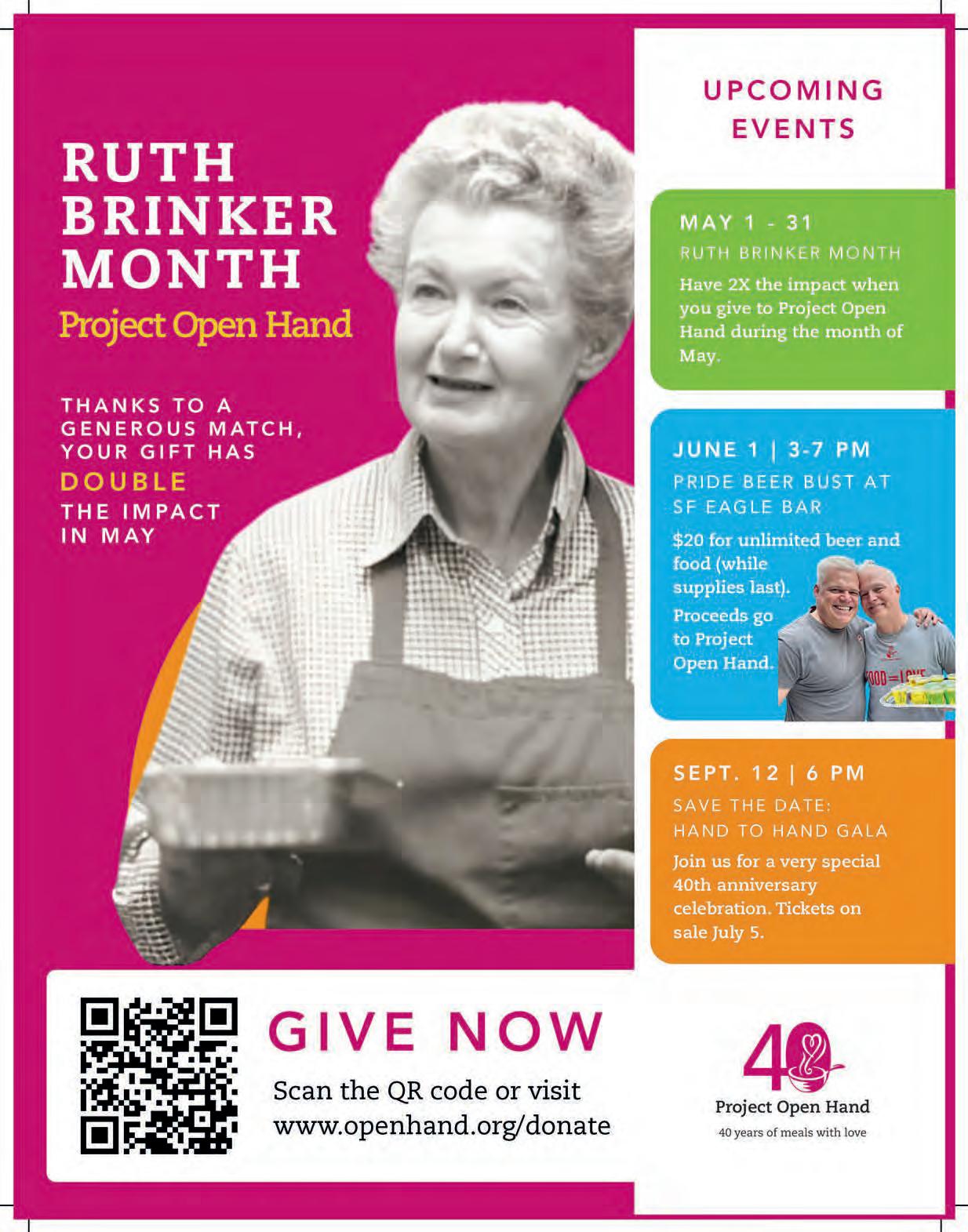
“One of the things we wanted to do was to look at how to develop a more cohesive international movement for LGBTQIA older adults rather than it be piecemeal,” said Yore, who hopes to be able to continue telling the stories of queer and trans older adults in some capacity going forward.
Project lives online
For now, the work she helped oversee at SAGE lives on digitally at the website sageusa.org/global-storyarchive where the interviews Yore and her counterparts in various countries conducted with older queer and trans individuals remain accessible to anyone with an internet connection. For the many people around the world who don’t know an LGBTQ older person, the online archive can provide them insight into their life experiences and current needs to be addressed.
“What this experience has taught me is these stories are more important now than ever before and really a salve to erasure,” said Yore. “Frankly, stories really are what I think will change hearts and minds, and introduce people to this population. A lot of folks don’t know older LGBTQIA adults, and younger people are looking for older queer people to look up to for guidance.”
With statisticians in the U.S. usually denoting older Americans as those 55 and up, and retirees perceived to be mainly in their early 60s or older, Mwachiro is still shy of being officially a part of either group. When asked about being included in a global seniors project, he quipped most people 20 years his junior see him as a “daddy” or “zaddy.”
“I decline daddy but zaddy might do,” joked Mwachiro about the nicknames used for older gay men. “I still see myself as relatively young. But I have lived half a century, that counts for something.”
The May 22 article
“Program aims to explore queer Christianity” has the following corrections. Andrew Tremblay and Loleita Vatikani are co-leaders of Queer Faith: In Action. Vatikani identifies as bisexual. Mark Hibbett’s surname was misspelled. Dates for future events have not yet been set, but there should be three more this summer. The online version has been updated. See page 6 >>
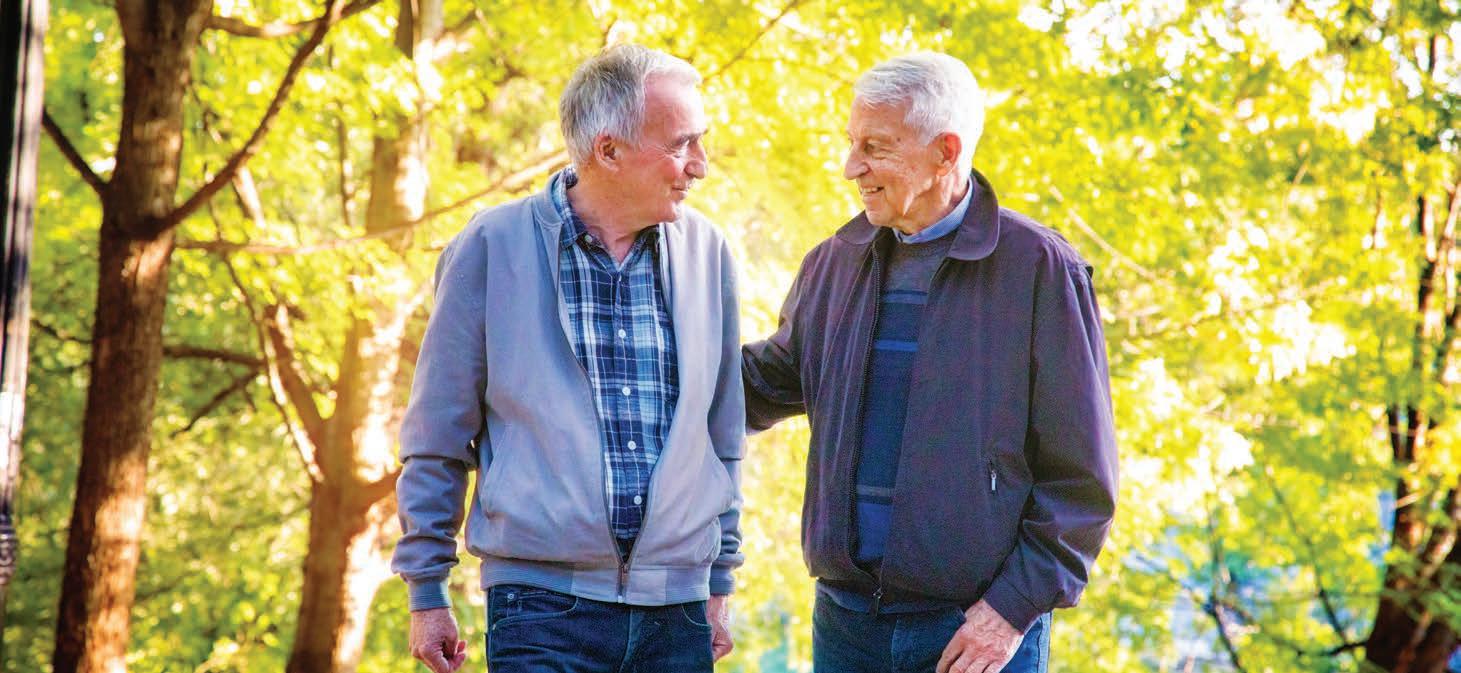
At 1440 By The Bay, diversity isn’t just welcomed—it’s celebrated. Our vibrant community is home to residents from all walks of life, creating a warm and inclusive environment where everyone belongs. With cultural events, interfaith discussions, and cooking classes featuring flavors from around the world, residents celebrate different traditions, perspectives, and backgrounds. Every story matters, every voice is heard, and true connections are formed.
More than just a senior living community, 1440 By The Bay is a place to call home—where individuality is embraced, friendships flourish, and support is always within reach.


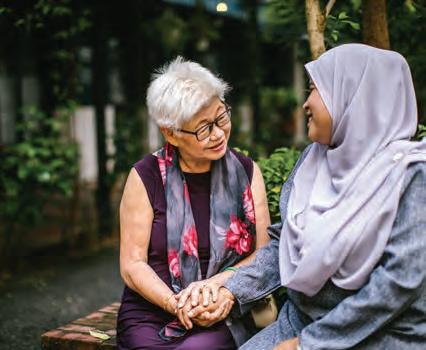
compiled by Cynthia Laird
The popular Drag Me Downtown series is back for Pride Month in June, with free weekly drag shows and new venues. The program is produced by the Downtown SF Partnership, a community benefit district that oversees 43 blocks across the Financial District and Jackson Square Historic District.
The third annual installment of Drag Me Downtown will take place each Friday in June from 5 to 7 p.m., with doors opening at 4:30. The series will culminate in a high energy block party, “Drag Me to Front Street,” headlined by Peaches Christ.
New venues this year include the Institute of Contemporary Art SF, which is celebrating queer history through its “stay, take your time, my love” exhibition by David Antonia Cruz, featuring visual artwork in response to San Francisco’s queer history, a news release stated.
Drag Me Downtown is free to attend; however, attendees are encouraged to pre-register to guarantee exclusive 2025 drag swag. The $10 registration fee will directly support the Transgender District, the release stated.
“San Francisco has a loud and proud history, and our third annual Drag Me Downtown series is a vibrant reminder of everything you can experience in the heart of the city,” stated Robbie Silver, a bi man who is president and CEO of Downtown SF partnership. “This marquee event champions the LGBTQIA+ community while supporting downtown businesses through inclusive, high-impact programming that reflects our district’s unwavering values.”
Bobby Friday, a local drag entertainer who has participated in Drag Me Downtown since the beginning, added, “The Downtown SF Partnership and the City of San Francisco give us a platform to express ourselves, live authentically, and spread more joy and love.”
This year’s schedule is: June 6, One
LGBTQ elders
From page 4
Striking a more serious tone, he noted there are few people his age or older willing to be so publicly out in Kenyan society as he is, via both his private life and professionally. A journalist who was educated at Daystar University in Kenya and Bournemouth University in the United Kingdom, Mwachiro worked for the BBC and other news agencies, often writing about the lives of LGBTQ Africans.
“My work is very known, very public. I have no gripes about that,” he said. “For me, it is important there is
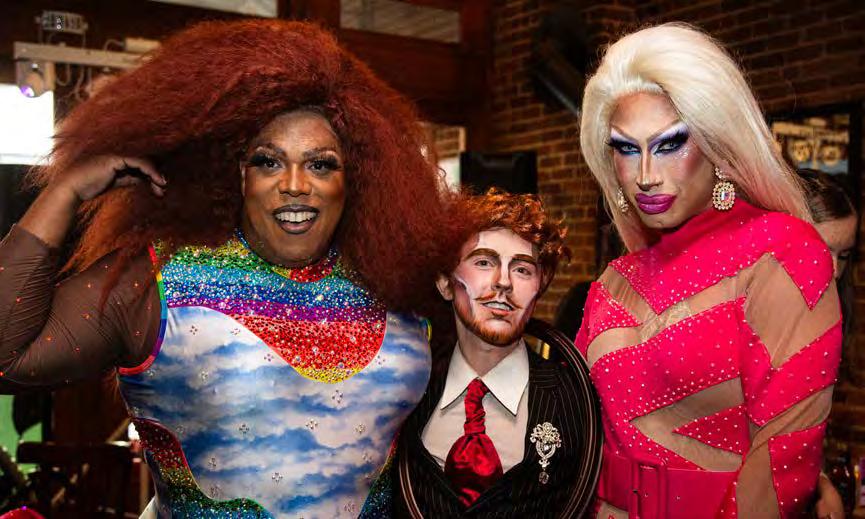
Market Restaurant, 1 Market Street, which recently announced it is closing June 11; June 13 at 101 California Plaza, in partnership with Pabu Izakaya; June 20 at the aforementioned Institute of Contemporary Art SF, 345 Montgomery Street; and the June 27 Drag Me To Front Street, on Front Street between California and Sacramento streets.
The Front Street program, on the Friday of Pride weekend, takes place within an entertainment zone, which began operation last year, the release stated. It will feature a drag show from 5 to 7 p.m. and a dance party from 7 to 8.
To pre-register for the June 6, 13, and 20 events, go to https://tinyurl. com/2zchsz7t
For the June 27 block party, go to https://tinyurl.com/ysz4wj45
visibility to being an openly African, Black African gay professional man.”
The participants in the global archive both said they haven’t met any of the others. Careaga had yet to see the online videos of them when she spoke with the B.A.R. this spring.
“When they asked me to get involved in this, I said yes to do that. I am interested to be much more visible as an elder people,” said Careaga, who received her master’s in social psychology from the National Autonomous University of Mexico and, in 1979, joined its psychology faculty.
She knew she was lesbian at age 14 and began to find an LGBTQ com-

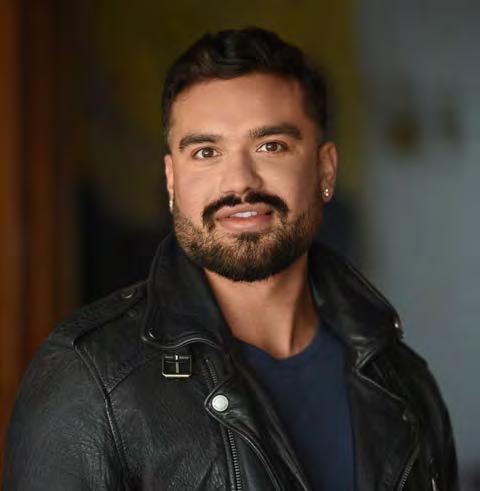



SF center’s Pride House Party
The San Francisco LGBT Community Center will hold its second annual Building the Block event Saturday, May 31, from noon to 6 p.m. at 1800 Market Street. The party is free and open to all ages.
Following last year’s Purple Pride Party that took place inside the center and on Waller Street, this year’s event has a block party theme. Each floor of the center will be activated to create an engaging space where the LGBTQIA+ community can connect with essential resources, deepen connections with one another, and celebrate Pride, an email announcement stated.
There will be live entertainment, queer programming, a free clothes closet, and swag giveaways.
People can sign up in advance, register on the day of the event, or drop by. To register, go to https://tinyurl. com/2282twyv.
Alameda public defenders hold block party
Leather district holds safety workshop
The Leather & LGBTQ Cultural District will hold a safety workshop Thursday, May 29, from 6 to 8 p.m. at SOMArts, 934 Brannan Street in San Francisco.
In a news release, district officials noted that issues will be addressed that have “recently become critical to our communities in these uncertain times.”
Members of the drag nun philanthropic group the Sisters of Perpetual Indulgence will talk about their Safety First, Sexy Second campaign they launched earlier this year. The cheeky and essential initiative is designed to help people navigate hookups safely –whether they meet at a bar, a party, cruising, or on dating apps like Grindr, Scruff, or Recon, according to a news release from the Sisters.
munity when in college in her 30s. She had a decade-long relationship with Patria Jiménez, the first out member of Mexico’s legislature.
Still teaching, Careaga said she is looking to retire soon in order to devote more time to her human rights work. In recent years, Mexico’s LGBTQ organizations have seen governmental fiscal support be rescinded, she noted, creating obstacles for improving the lives of queer and trans people in the country, especially those who are older.
“I think the LGBTQ organizations that are working on our rights must make much more visible that the elders exist. I mean, we have to make it visible that there are many elders within our community,” said Careaga.
Mwachiro also came out later in life, at age 28, while living in Britain. He was accepted by his family and found support from his Anglican pastor, an American estranged from his gay brother living in San Fran-
the people they serve and undermines public health, equity, and inclusion.”
“We look forward to continue defending these organizations during the next steps in this case and to ensuring that these organizations can fully fulfill their missions—without fear, without funding stripped, and securing their ability to advocate for and serve transgender people and everyone living with HIV,” Abrigo continued.
TerMeer added that SFAF is appreciative of Lambda Legal’s efforts.
“We’re deeply grateful to Lambda Legal for their fierce representation, to our co-plaintiffs for their courage, and to the court for hearing our plea for protection through a preliminary injunction. We know what’s at stake —
Former Bay Area Reporter leather columnist Race Bannon and Brent Heinze will facilitate a discussion on how to best advocate for a person’s com munity, including actions people can take to move their community’s interest forward and how to maintain safety.

Ms. SF Leather 2025 Madam Folly will enter tain with her rendition of “Flagging Narcan, Topping Overdose!” In the training, attendees will learn how to respond to an overdose and how to watch out for the most toxic “top” of all, fentanyl, the release stated. The meeting is free and open to interested members of the public. For more information, go to the leather district’s website at sfleatherdistrict.org.
cisco, Mwachiro recalled.
“We felt a strong friendship in that,” he said. “I was able to present myself to him and his wife as a struggling gay man. I wasn’t embracing it fully but knew I wasn’t attracted to women.”
When he returned to Kenya following his postgraduate studies, Mwachiro became an LGBTQ activist and was public about his own personal story. In 2015, he was diagnosed with multiple myeloma, a form of blood cancer, which is now in remission, and seven years ago he opted to move closer to the ocean for his health.
“I told people the sea was calming, so I moved out to the sea,” said Mwachiro, as Kilifi sits on the Indian Ocean a 35-mile drive northeast of Mombasa.
He has yet to attend San Francisco’s international LGBTQ film festival Frameline, but just hosted the 13th edition of his film festival in
and we will not back down. Our communities deserve nothing less than our full commitment to this fight and the lifesaving work that defines who we are.”
Roberto Ordeñana, a gay man who is executive director of the GLBT Historical Society, stated May 23, “We thank Lambda Legal, our counsel, as well as our fellow co-plaintiffs for challenging these harmful executive orders. We remain committed to continuing this fight in the weeks, months, and years to come.”
“Yesterday, the GLBT Historical Society joined our co-plaintiffs for oral arguments on the preliminary injunction challenging three executive orders that seek to erase transgender, non-binary, and gender-expansive people and communities from public life, as well as defund organizations that provide life-saving services while
The Alameda County Public Defenders office will hold a block party Saturday, May 31, from noon to 4 p.m. at DeFremery Park, 1651 Adeline Street in West Oakland. The event is free and open to everyone. According to a news release, the afternoon will feature food, live music, kids’ activities, clean sheet criminal record repair services, an immigrant teach-in for immigrants and their allies, flu and COVID vaccine clinics (pre-registration is recommended at https://my.primary.health/l/baplsvaccine), and much more.
For more information, and to RSVP, go to https://tinyurl.com/3259bc3n. t
February. Today, not only are there more African LGBTQ filmmakers, Mwachiro is finding more films in local languages shot in various countries, from Namibia, Lesotho, Tanzania and Egypt, to screen.
“My primary audience is other Kenyans and showing them there is community out there on the continent,” he said. “We are not out of the woods but far from it. We do have moments of progress.”
It was why he agreed to take part in SAGE’s archival project when approached about being featured in it. Growing up he felt alone in not feeling heterosexual, and later came to understand the need for LGBTQ people to be seen in public so others could also feel seen.
“Our queerness has history,” said Mwachiro. “And projects like this are important to celebrate who we are, where we come from, and where we are going.” t
terminating equity-related grants essential to the health and lives of underserved communities – including communities of color and people living with HIV,” he stated.
Ordeñana continued, “these efforts at censorship ... go against our mission of preserving and sharing” LGBTQ history.
“Coinciding with what would have been Harvey Milk’s 95th birthday, we reflect on his sage advice during these oral arguments – hope will never be silent,” he continued. “Transgender women of color, including Marsha P., Johnson, Sylvia Rivera, Felicia Flames Elizondo, and Tamara Ching – along with countless nonbinary and genderexpansive people who rose up against injustice at Stonewall and Compton’s Cafeteria here in San Francisco – have always been at the forefront of the LGBTQ+ civil rights movement and will never be forgotten or erased.” t


Volume 55, Number 22
May 29-June 4, 2025 www.ebar.com
PUBLISHER
Michael M. Yamashita
Thomas E. Horn, Publisher Emeritus (2013)
Publisher (2003 – 2013)
Bob Ross, Founder (1971 – 2003)
NEWS EDITOR
Cynthia Laird
ARTS & NIGHTLIFE EDITOR
Jim Provenzano
ASSISTANT EDITORS
Matthew S. Bajko • John Ferrannini
CONTRIBUTING WRITERS
Christopher J. Beale • Robert Brokl
Brian Bromberger • Philip Campbell
Heather Cassell • Michael Flanagan
Jim Gladstone • Liz Highleyman
Brandon Judell • Lisa Keen
Philip Mayard • Laura Moreno
David-Elijah Nahmod • Mark William Norby
J.L. Odom • Paul Parish Tim Pfaff
Jim Piechota • Adam Sandel
Jason Serinus • Gregg Shapiro
Gwendolyn Smith • Charlie Wagner
Ed Walsh • Cornelius Washington • Sura Wood
ART DIRECTION
Max Leger
PRODUCTION/DESIGN
Ernesto Sopprani
PHOTOGRAPHERS
Jane Philomen Cleland
Rick Gerharter • Gooch
Jose A. Guzman-Colon • Rudy K. Lawidjaja
Georg Lester • Rich Stadtmiller
Christopher Robledo • Fred Rowe
Shot in the City • Steven Underhill • Bill Wilson
ILLUSTRATORS & CARTOONISTS
Christine Smith
VICE PRESIDENT OF ADVERTISING Scott Wazlowski – 415.829.8937
NATIONAL ADVERTISING REPRESENTATIVE Rivendell Media – 212.242.6863
LEGAL COUNSEL
Paul H. Melbostad, Esq.
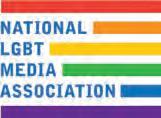

California is facing a projected $7.9 billion budget shortfall, and to make up for it, Governor Gavin Newsom is scapegoating LGBTQ health programs, according to advocacy groups that reviewed the May Revise that he announced a couple of weeks ago. Of course, California may also see the potential loss of federal dollars due to negative fiscal impacts coming from the Trump White House and congressional Republicans. But Newsom is sending the wrong message by axing a fund designed specifically for queer women’s health programs, the $17.5 million Lesbian, Bisexual, and Queer Women’s Health Equity Fund. Additionally, the governor’s proposal eliminates entirely the Gender Health Equity Section in the California Department of Public Health’s Office of Health Equity, a $15.5 million cut, and the elimination of the health equity office’s California Reducing Disparities Project, another $15.8 million cut. The possibility of these cuts would have a devastating impact on programs that serve LGBTQ+ communities across the state, particularly transgender, gender-nonconforming, and intersex Californians, as several advocacy groups noted in a letter to legislative leaders.
State legislators must restore this funding in their budget blueprint that will be sent to the governor by mid-June. Already, gay state Senator Scott Wiener (D-San Francisco) told us that Newsom’s revised budget is not the last word on this matter.
As statewide LGBTQ rights organi zation Equality California, the California LGBTQ Health and Human Services Network, the Los Angeles LGBT Center, the TransLatin@ Coalition, and many other groups noted in their letter, “Gutting and eliminating these groundbreaking divisions of CDPH signal a setback in California’s national leadership role for advancing health equity.”
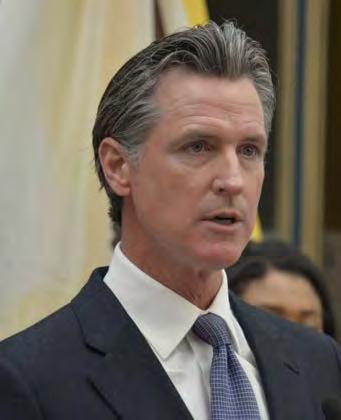
munity-based organizations,” the letter stated. “Of these 68 grantees, nearly one-third are LGBTQ+-led, and more than half are for projects directly serving LGBTQ+ populations.”
The letter explains that the Office of Health Equity is the only entity in state government with a “focused mission to reduce health disparities through culturally responsive, community-driven investment. The programs are not theoretical –they are lifelines.”

“The vast majority of this combined -$31.3 million funding cut for GHES and CRDP is directly granted to more than 68 different com-
And that’s what we’d like to focus on here – the importance of these programs to LGBTQ people throughout the Golden State. They are needed now more than ever, largely due to the Trump administration systematically gutting programs that benefit LGBTQ people. The proposed federal budget passed by the House of Representatives last week bans coverage of hormone replacement therapy specifically for transgender people of all ages via Medicaid. California is supposed to be a refuge for trans kids and their families, but that status will ring hollow if the state cuts are
by Gwendolyn Ann Smith
This week, I want to talk to those casual readers who may not be transgender themselves. To my trans readers, perhaps consider passing this along to your friends and family who need a hand grasping what it is to be trans or nonbinary in 2025.
The other day I retrieved an envelope from our mailbox. I quickened my step with it to bring it home, then cautiously opened the envelope. I knew what it was, but I was worried.
You see, it was my renewed driver’s license. My birthday is in a couple of months and, with that, it was time for a new license. I sliced the envelope open carefully, and extracted the new card. I quickly checked it over, first seeing that it was still a Real ID card, then that it still had the correct gender marker. Thankfully, it did.
The next time I fly within the country, should I need to, I’ll opt to use it over my passport. I figure my driver’s license has less likelihood of being confiscated and invalidated as I pass through a Transportation Security Administration checkpoint.
Yes, this is a possibility.
I did update my passport in late 2024, even though it had a couple of years left on it. I wanted to make sure I had a decade to go before it once again needed an update – just to hedge my bets a little. Now it and my driver’s license do not need to be renewed until the 2030s, a time distant enough into the future that I am not even sure I’ll still require them at all by that point.
Being transgender in 2025, you see, means having to plan for all sorts of eventualities like this. In addition to fears about identity paperwork, I also am carefully stockpiling my medications, taking just a little less than I have by prescription, just to make sure I have something spare for the months ahead. I know many others who are doing the same, and others who are finding ways to acquire their hormone replacement therapy in other ways.
This is important, as the federal budget proposal passed this month in the House of Representatives bans coverage of hormone replacement therapy specifically for transgender people of all ages via Medicaid and, potentially,
approved. Additionally, as the national Human Rights Campaign pointed out, the House bill’s cuts pose significant threats to critical programs that disproportionately serve LGBTQ+ individuals and families, particularly those who are low-income, living with HIV, or facing food insecurity.
Add to that the potentially devastating cuts to California’s programs that Newsom has proposed, and that means low-income LGBTQ people will be severely affected.
Wiener told us that the state Senate is working on its budget proposal. “The Senate is working hard to protect our communities while meeting our constitutional obligation to balance the budget,” he said.
We’re disappointed that over the last few months, Newsom has seemed to believe it’s politically expedient to scapegoat the LGBTQ community while tip-toing around President Donald Trump and his MAGA cronies. First it was the comments made on his podcast that he’s not supportive of trans women and girls playing on female sports teams. Now comes his May Revise that defunds health programs to help queer women, trans people, and others in the community.
“Governor Newsom’s proposed cuts to the LGBTQ+ Health Equity Fund are a moral failure and a betrayal of California’s most vulnerable,” noted Joe Hollendoner, a gay man who’s CEO of the LA LGBT Center.
In this time of retreat by the federal government of funding for valued and effective health programs, it is left to states to take care of their most vulnerable residents. Now, it appears it is up to state lawmakers here to restore the health equity funding and the grant funding that Newsom has axed. The governor’s proposal is indeed a moral failure. He went to the BottleRock Napa Valley over the holiday weekend to tell the San Francisco Chronicle that he will fight for arts funding. “Make arts matter again,” he told the paper.
But there won’t be much art to make if artists, including queer ones, aren’t healthy. t
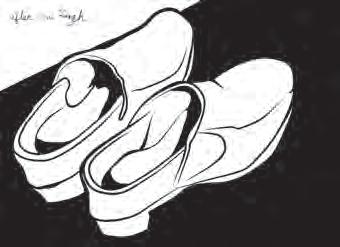
the Affordable Care Act. (The budget bill now heads to the U.S. Senate.) With the GOP-controlled Congress, as well as President Donald Trump and a conservative U.S. Supreme Court, it feels more than unlikely that trans care will remain as accessible in the coming months.
Harkening back to the issue of passports, the current administration – thanks to Trump’s executive order issued on January 20, his first day back in the White House – has also declared that there are only two sexes, and that these are wholly immutable. Hence, the concerns around identification paperwork, and raising the specter of any sort of other sex segregated places from restrooms to police searches.
I’ll admit, if the ghouls in our gov ernment did take away the “F” on my paperwork, it wouldn’t change who I am. When I transitioned, I wasn’t able to get it changed for many years, and I survived. I suspect I could again, if I had to.
Yet, that letter on my paperwork designates, legally, who I am. That’s mine, and no one should be able to take it away.
your job, and how do you do all the things you need to do in your day? What might this do to the quality of your life?
This is the fresh hell every transgender person is going through, every day, in 2025.
I’ve said it before: people do not become transgender. People are transgender. We don’t so much transition but, rather, we reveal ourselves. We’ve always been trans, but we had to come to that understanding within our lives.
The thing I want to impress upon those who are not transgender is this: transgender people like me and nonbinary people have likely spent a large part of our lives feeling like something about us is – to put it simply – wrong. Transition is the means of making things right, and it is something that trans people can feel on a very core level.
Just like you might feel if everyone tried to force you to be a different gender.
For you today, your heart doesn’t skip a beat as you timidly open a letter from the Department of Motor Vehicles. Your big fear might be a bad photograph, while mine is having to defend my very being.
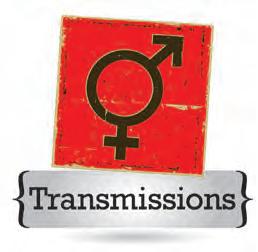
I want to provide a little thought experiment that I hope the non-trans readers who have stuck around will take a moment to consider. Let’s say that the government decides you are a different gender than you currently are. How does this change who you are innately; how does this change your day-to-day life in society, and what do you do in response?
Take it seriously, and really consider how this might affect your life: how do you keep
Likewise, your time in a TSA line is an annoyance but is unlikely to stop you from boarding. Having your ID confiscated, ending up in custody, and so on, is not in the forefront of your mind.
Imagine if your very self was up for continual public debate, and the general consensus was that – at best – you weren’t worth the trouble to defend.
You may be rightfully concerned about what is happening with the U.S. Department of Health and Human Services, and if vaccinations will be available. Now, imagine if you were barred from life-saving medication expressly because of who or what you are.
This is our reality, today, and this is what every trans person is up against right now. t
Gwen Smith wears a size 13w. You can find her at www.gwensmith.com.
by Matthew S. Bajko
For years local National Park Service staff, whether LGBTQs or straight allies, have marched as a contingent in the San Francisco Pride parade. Two years ago, they decided to host their own community event to kick off Pride Month in June.
Dubbed Pride in the Presidio, it was held in the former military base turned national park on the northern edge of San Francisco. Overseeing the festivities was the Partnership for the Presidio, comprised of the National Park Service, the Presidio Trust, and the nonprofit Golden Gate National Parks Conservancy.
It also sparked the creation of the partnership’s first-ever Parks for All! collection of Pride-themed park gifts and collectibles that were for sale at the Presidio Visitor Center. Pride bunting adorned the building that now fronts the Tunnel Tops picnic and children’s play areas with stunning views of Alcatraz and the Golden Gate Bridge.
Parks officials had noted that the late Gilbert Baker, the gay man who co-created the first Pride flags back in 1978, was a former Army medic stationed nearby in the Presidio in 1970.
Two years later he would be honorably discharged in February 1972.
“Celebrating LGBTQIA+ Pride outdoors is one way we hope way to make public spaces welcoming for all people and communities. Thank you to everyone who came out, joined in, and shared their Pride in the parks!” noted the parks conservancy in a post Pride 2023 write up.
Alas, there will be no Presidio Pride event this June. It was noticeably missing from the “Summer at the Presidio” lineup of events the park released in early May.
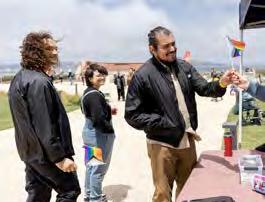
check Tuesday of its event page, when searched using the LGBTQ category, resulted in the message, “There are no events with that criteria at this time.”
Back in February it held a volunteer event called “Belonging in Nature: BIPOC Queer and Trans Community Day.” Participants received a tour of Hummingbird Farm in San Francisco, an urban agriculture program overseen by PODER!
Neither Lehnertz nor a spokesperson for the parks conservancy have responded to the B.A.R.’s requests for comment about its Pride plans this year.
Having been invited to the inaugural Presidio Pride event in 2023, at which he briefly addressed the attendees, gay state Senator Scott Wiener (D-San Francisco) expressed disappointment at it not taking place this year. He learned about its cancellation when contacted by the B.A.R. for his reaction.
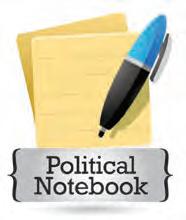
Asked by the Bay Area Reporter about the status of the LGBTQ celebration, Presidio spokesperson Lisa Petrie confirmed it would not be taking place this year. The reason being the anti-LGBTQ executive orders signed by Republican President Donald Trump earlier this year that ended diversity programs at federal agencies.
“The Presidio Trust invites permit applications from any organization wishing to host an event in the park, including Pride. However, as a federal agency, the Trust would not be able to co-sponsor such an event this year due to the requirements of a recent executive order,” explained Petrie.
The legal team for the trust, which oversees the federal park site, cited two EOs signed by Trump for why it is prohibited from doing so. The first, titled “Defending Women From Gender Ideology Extremism And Restoring Biological Truth To The Federal Government,” Trump signed on his first day back in the Oval Office January 20.
It effectively barred the federal government from acknowledging the existence of transgender individuals and restricted federal funds from being used “to promote gender ideology” and instructed “each agency shall assess grant conditions and grantee preferences and ensure grant funds do not promote gender ideology.”
The second Trump order cited by Presidio officials is titled “Ending Illegal Discrimination And Restoring Merit-Based Opportunity” and was signed by Trump on January 21. It forbade federal agencies from engaging in diversity-based programs and initiatives, ordering them to “terminate all ‘diversity,’ ‘equity,’ ‘equitable decision-making,’ ‘equitable deployment of financial and technical assistance,’ ‘advancing equity,’ and like mandates, requirements, programs, or activities, as appropriate.”
While in years past the nonprofit parks conservancy group, led by lesbian President and CEO Christine Lehnertz, organized a number of events for LGBTQ parkgoers, in addition to co-hosting the Presidio Pride event, it has not publicized any taking place this month or next. A
events to celebrate Pride Month in June. The first is being presented in partner ship with Oakland’s Sistah Scifi, the first Black-owned bookstore focused on sci ence fiction and fantasy in the U.S., and will highlight the legacy of the late Black queer science fiction author Octavia E. Butler.
Called “A Teenage Superhero: Cel ebrating Octavia E. Butler’s Lauren Oya Olamina,” it will feature a panel discus sion about Butler’s work, her teenage protagonist Olamina of “Parable of the Sower,” and how to inspire young people to follow in her literary footsteps. Mod erating it will be 16-year-old East Bay au thor “The Imagination Book” and “Evil Bur rito and the FBI.”
The free event will take place at 6 p.m. Tuesday, June 10, at the Hormel Center on the third floor of the Main Library at 100 Larkin Street and will also be livestreamed online. For more informa tion and to RSVP, visit https://tinyurl. com/2x5mfcxf.
And the Hormel center’s TV talk show inspired Booked & Beautiful series will feature drag spectacular “PRINCESS” at Oasis Nightclub on Saturday nights, for its third episode. Hosted by artist and performer SNJV will take place from 6 to 7:30 p.m. Tues day, June 24, in the Main Library’s lower level Koret Auditorium.

“Trump and his cult are determined to eliminate LGBTQ people from public life – to make us disappear. That’s why they’re systematically eliminating Pride celebrations and bullying others to ban Pride. But we’re not going anywhere,” declared Wiener in a texted reply. “It’s awful that the Presidio is ending its Pride celebration, but we’ll just celebrate harder during San Francisco Pride to make up for it. And once we scrape Trump out of office and take back our country, we will have Pride at the Presidio again.”
The San Francisco chapter of PFLAG, the organization for LGBTQ families, had been a featured community partner at last year’s Presidio Pride event. Board president Robert Costic, a gay married attorney in San Francisco, told the B.A.R. anyone looking for a way to celebrate Pride this June can join the chapter’s contingent in the city’s parade on June 29. (Sign up info can be found at https:// pages.pflagsf.org/pride2025.)
“The Presidio won’t be hosting a Pride event this year due to changes in federal funding. While disappointing, it only strengthens our resolve,” noted Costic. “We’re grateful to everyone who made last year’s Presidio Pride possible. It was a joyful, affirming day – one that brought families, allies, and LGBTQ+ people together in one of our city’s most iconic public spaces.”
But Pride isn’t about one location, added Costic, stressing it has more to do with community, visibility, and enduring love.
“This year we will be showing up loud and proud at our San Francisco Pride parade and we welcome each and every member of our community, our families, our friends and our allies to join us,” he stated. “PFLAG San Francisco has always been here to support, resist, and thrive in the face of adversity. We invite you to be out, loud and visible with us.”
The San Francisco Public Library’s James C. Hormel LGBTQIA Center also had been invited to take part in last year’s Pride in the Presidio. It had set up a table with queer books, reading nooks for people to enjoy, and brought library giveaways to hand out.
“I’ve been informed by the organizers that it was canceled, which is unfortunate. I do not know why,” Cristina Mitra, the Hormel Center’s program manager, told the B.A.R. in response to an inquiry on if it had been contacted about returning to the event this year.
The Hormel center and the San Francisco Public Library are hosting two special
As for the parks conservancy, it still has a page with information about the LGBTQ history of various Golden Gate National Recreation Area park sites at https://tinyurl.com/ehrssmcw. While the nonprofit still uses the T for transgender on the webpages it directly oversees, when clicking on the links it lists to websites managed by the National Park Service visitors will find the T has been scrubbed. It is due to Trump’s executive orders attacking “gender ideology.”
The parks conservancy will be hosting its third annual Parks4All: Brewfest on July 19. As noted on the event page at https://tinyurl.com/4ccrfdza to buy tickets, it is a benefit for the nonprofit’s inclusive programs, “which connect people of all backgrounds to the wonders of the Golden Gate national parks.”
It continues to sell “Parks for All!” branded Park Pride merchandise online at https://tinyurl.com/24zef9sp. The cur rent design utilizes the colors of the trans and people of color inclusive Progress Pride flag in a more subtle way for the text and tree figures adorning the various products, from apparel to keychains.
A note proclaims, “Your purchase helps make parks more inclusive and ac cessible for all. The Parks Conservancy breaks down barriers so diverse commu nities can connect with nature, history, and each other. Shop today to support parks where everyone belongs.”
In terms of park staff participating in this year’s Pride parade, it is unclear if they will be allowed to do so in uniform, as in years past. In 2024, after NBC News reported a memo had been sent to park rangers stating they could not march in uniform, the resulting public backlash resulted in then-Interior Secretary Deb Haaland issuing a second memo effectively stating uniformed park rangers could participate in Pride parades last year.



With the U.S. Department of the Interior, which oversees the National Park Service, now led by Trump appointee Doug Burgum, it remains to be seen if that policy will be upheld this June. To date, Pride Month is still listed as one of the “Special Emphasis Observances” recognized by the federal agency per the webpage https://tinyurl.com/37dnm89e.
An Interior spokesperson did not respond to the B.A.R.’s inquiry on what the current policy is for Pride parade participation by park staff. The Presidio Trust’s Petrie referred the B.A.R. to spokespeople for the Golden Gate National Recreation Area, who have yet to say if local national park staff will again be making an appearance in this year’s San Francisco Pride parade. t
DEADLINES: Friday 12 noon for space reservations Monday 12 noon for copy & images TO PLACE: Call 415 829 8937 or email us at advertising@ebar.com
Obituaries of 200-words or less are FREE to place. Please email obituary@ebar.com for more information.

“I’m working with SFMTA to further improve traffic flow and pedestrian safety,” he added, referring to the San Francisco Municipal Transportation Agency.
“I’m fixing problems big and small for residents, supporting merchants, and working with the mayor and my colleagues to pass legislation that addresses pressing issues on public safety, housing, and our local economy. I’m hosting a Budget 101 town hall this week [May 29 at 6 p.m. at 2201 Lawton Street] to help residents understand our city’s complex budget. I’m continuing to do the job of supervisor as I always have.”
At a rally before turning in the signatures May 22, Albert Chow, president of the neighborhood organization People of Parkside Sunset and owner of Great Wall Hardware, said, “We fought for something bigger than any one issue.”
Highway park riled voters
However, the issue top of mind for many speakers was Engardio’s support of Prop K. Voters passed Prop K last November to close the portion of the roadway, and the area is now a city park called Sunset Dunes.
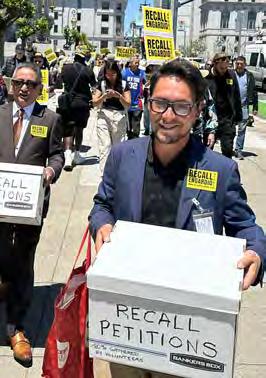
Otto Pippenger, who works for the campaign to recall Supervisor Joel Engardio, carried a box of petitions to submit to the San Francisco Department of Elections May 22.
Selina Chu, a former school board candidate, said that Engardio, whom she described as a former friend, “failed to represent our Sunset community” before, during, and after the change. Before Prop K was approved by San Francisco voters, the highway had been open to vehicle traffic on weekdays as part of a compromise brokered by Engardio’s predecessor, supervisor Gordon Mar, between the factions warring over the
Pride events
From page 1
The parade steps off at 11 a.m. at Cathcart Street and Pacific Avenue. A festival follows from noon to 4 p.m. with stages at Abbott Square and the Clock Tower.
For more information about all the festivities, go to santacruzpride.org.
Sonoma County
Sonoma County Pride will mark its 40th anniversary with a parade and festival Saturday, May 31. The parade starts at 11 a.m. at the Old Courthouse Square in Santa Rosa. The theme is “Forty and Fierce: A Ruby Celebration of Pride.”
Graton Resort and Casino is partnering once again with the Pride organization and will sponsor a number of events, including the Ruby Ripple Pool Party at the resort, 288 Golf Course Drive West, in Rohnert Park, on Sunday, June 1, from noon to 6 p.m. (People must be 21 or older to attend.) Tickets start at $45.
Pride weekend will kick off with a rally for transgender rights Friday, May 30, from 4 to 6 p.m. at the abovementioned Old Courthouse Square.
“What began as a modest community picnic has blossomed into one of Northern California’s most vibrant celebrations of LGBTQIA+ visibility, resilience, and joy,” stated Christopher Kren-Mora, president of Sonoma County Pride. “For four decades, Sonoma County Pride has honored the power of queer community – lifting up voices, demanding equity, and building spaces where all people can live and love authentically.”
For more information, go to sonomacountypride.org.
The 11th annual Richmond Rainbow Pride parade and event will be Sunday, June 1. The parade begins at 10 a.m. at Nicholl Park, 3230 Macdonald Avenue. Organizers stated that this year, there will be a walking parade to Richmond Civic Center via 26th Street and participants are encouraged to bring signs, flags, and energy.
The Pride event takes place from 11 a.m. to 4 p.m. at the civic center, 440 Civic Center Plaza. There will be live music, community booths, and drag performances.
This year’s theme is “Forged in Resistance, Shaped by Love.”
For more information, go to richmondrainbowpride.org.
The K Stewart Foundation and Richmond Rainbow Pride will hold an inaugural “Out & Excellent Honorees” event Saturday, May 31, from 1 to 5 p.m. at CoBiz, 1503 Macdonald Avenue, Suite
A. There will be music, art, and awards. Tickets start at $15 and can be purchased at https://tinyurl.com/c5hvwcre.
stretch of road along Ocean Beach.
Engardio said in a 2022 debate with Mar that he supported the compromise that left the thoroughfare open to cars on weekdays.
Asked about this by the B.A.R. earlier this year, Engardio said that on his campaign website in 2022, he stated he supported the possibility of a park between Lincoln and Sloat, but that he “supported the compromise in 2022 because that was the best we had in the moment.”
Engardio added that the other side “spent 2023 and much of 2024 trying to kill the weekend compromise,” and anticlosure advocates supported a citywide vote on the Great Highway back in 2022 when it was Prop I, a measure they supported but that failed.
Chu claimed Engardio “bypassed the Sunset completely when he submitted a permanent closure plan without a single town hall meeting. When he was confronted, he pointed fingers and blamed others.”
“He ran on promises to represent our Sunset District 4 but acted against the very people who elected him,” she continued.
Despite the majority who voted for Prop K citywide, not a single precinct in District 4 supported the measure.
In his statement to the B.A.R. May 27, Engardio invited residents to reconsider

Clayton
The East Bay city of Clayton will hold its Pride parade and festival Sunday, June 1. This year’s theme is “Now More Than Ever, Love Matters.”
The parade begins at 10 a.m. downtown, followed by the festival in the Grove until 3:30 p.m. That will feature food trucks, a poetry slam, vendors, and a kids’ area.
For more information, go to claytonpride.com.
Suisun
Up in the North Bay, Solano County Pride Center will hold the Suisun City Pride festival Sunday, June 1, from noon to 6 p.m. at Harbor Plaza, 520 Solano Street. The gathering is free to attend and will feature community resources, vendors, live bands, and cultural entertainment.
For more information, go to solanopride.org.
El Cerrito flag raising
The LGBTQ-majority El Cerrito City Council will hold a flag raising ceremony Monday, June 2, at 4 p.m. in front of City Hall, 10890 San Pablo Avenue.
As the Bay Area Reporter previously noted, following last November’s election, four of the five councilmembers are LGBTQ. That includes Black lesbian Mayor Carolyn Wysinger, who was appointed to the rotating post in December. The others are gay council veteran Gabriel Quinto, gay dad William Ktsanes, and lesbian mom Rebecca Saltzman. (Straight ally Lisa Motoyama rounds out the five-member council.)
In a news release, Wysinger, a former board president of San Francisco Pride, noted the importance of the event.
“This annual flag raising is more than just an event; it’s a powerful symbol of our unwavering support and solidarity with our LGBTQIA+ community,” Wysinger stated. “El Cerrito is a place where everyone belongs, and this celebration reinforces our commitment to fostering a welcoming and inclusive environment for all.”
The Progress Pride flag will fly at City
Sunset Dunes.
“I invite people to explore Sunset Dunes and our coast in new ways,” he stated. “The coast belongs to everyone and now it’s more accessible to people than ever. Come experience this space to be reminded that joy and a positive connection to humanity and nature can exist in today’s world.”
Engardio added, “If the recall qualifies for a special election, I’m confident that a majority of Sunset voters will oppose it.”
“I hear from many residents who approve of the job I’m doing,” he stated. “Some who initially opposed the park now say they like it. They realize the recall is misguided because it’s about my role in offering people a choice about what to do with their coast. I supported an open and transparent democratic process where everyone had an equal say at the ballot box. And everyone had ample opportunity to campaign for and against the issue.
“A recall won’t reopen the Great Highway and it sets a bad precedent for recalling officials over a single policy disagreement,” he continued. “If there’s a recall every time we disagree with one issue, we won’t have a functioning government. I appreciate the support of thousands of residents who are standing with me. Every week that goes by as traffic redirects to where it needs to go and
Department will honor Pride with a citywide celebration, a news release stated.
Drag queen bingo takes place Friday, June 6, from 10:30 a.m. to noon at the Civic Park Community Center, 1375 Civic Avenue. The cost is $20 and people must be 18 or older.
Saturday, June 7, will see a drag open space hike from 9:30 to 11 a.m. at Borges Ranch, 1035 Castle Rock Road. The event is free.
the park becomes more popular, we will see how the benefits surpass any costs and concerns.”
Engardio campaign strategist Josh Raznick told the B.A.R. that, “Nothing has been decided yet.”
“We respect the democratic process and the SF Department of Elections and their work,” he stated. “We eagerly await the results of their manual count, but anyone claiming this is over is jumping the gun.”
Proponents have to have 9,911 signatures verified. The recall campaign said May 22 that it had collected over 14,000.
“Those are numbers that represent people, that represent the voice of our commitment to democracy,” Chow said.
Also speaking at the rally was longtime westside resident Quentin L. Kopp, a former San Francisco supervisor, San Mateo County Superior Court judge, and a 1979 candidate for San Francisco mayor against the late mayor and U.S. senator Dianne Feinstein.
Kopp, 96, intoned, “Prop K was rammed down our throat by Mr. Engardio” and that’s “what he bestows on people who counted on him to protect their way of life.”
Pippenger said, “As a professional campaign operative, I have never seen commitment, engagement, turnout like this.”t
email stated staff would be “glamming up” the mansion and lighting up the terrace to provide a high energy experience with DJs, a burlesque show, and LGBTQ+ creatives sharing their brilliance. Tickets are $55.
Hall throughout June. Interested members of the public are welcome to attend the flag raising.
Pride in the Park
The East Bay Regional Park District will hold its third annual Pride in the Park Saturday, June 7, from 10 a.m. to 3 p.m. at Tilden Nature Area in Berkeley. The event is free and all are welcome, a flyer stated.
People can bring a picnic and enjoy family-friendly activities, crafts, and nature in celebration with the LGBTQIA+ community. Scheduled events include a puppet show at 11 a.m. and 2 p.m.; drag story hour with Ms. Wyldflower at noon; facepainting at noon; and a scavenger hunt and games at 1.
Pacifica
Coast Pride in San Mateo County will hold the Pacifica Pride parade and festival Saturday, June 7. The parade begins at 11 a.m. down Palmetto Avenue. The festival starts at 11:15 a.m. and runs until 3 p.m. at Ingrid B. Lacy Middle School, 1427 Palmetto Avenue.
For more information, go to coastpride.org.
Concord
Concord will have its Pride events Saturday, June 7. There will be a march down Main Street starting at 10 a.m., and a kick-off rally at 11. Then, there will be several activities at various locations from noon to 3 p.m. These include a free ice cream truck, Pride craft party, and teen queer-eoke at the Concord Free Public Library, 129 Main Street; a Pride lawn party at First Unitarian Universalist Church, 20 Lexington Road; and a Pride pool party at Emerson Pool, 90 Stow Street.
There will be a free family day at Umbrella Arts Center, 40 Stow Street, from 2 to 4 p.m. At 4, there is Pride in the Park at Rideout Park, 61 Laws Brook Road.
For more information, go to concordpride.org
Walnut Creek
The Walnut Creek Arts and Recreation
That same day will be Pride Day at Bedford Gallery, 1601 Civic Drive. There will be storytime with author Kate Navolio at 10:30 a.m. (free), followed by a “Pride in Every Hue” workshop at 11:30 ($15). This guided experience teaches techniques for blending and mixing hues.
A post-show Pride mixer will be held Wednesday, June 18, at 10 p.m. following the performance of “Happy Pleasant Valley: A Senior Sex Scandal Murder Mystery Musical” at Lesher Center for the Arts, 1601 Civic Drive. (Admission is included with show ticket, drinks sold separately.)
Finally, the Pride Art Fest will be held Wednesday, June 25, from 6 to 8 p.m. at Shadelands Art Center, 111 North Wiget Lane. (Free with optional paid arts experiences.) This all-ages event is hosted by the Center for Community Arts and features hands-on art activities, music, local vendors, and community partners.
“All of our Pride events this year are joyful tributes to love, self-expression, and community,” stated Elizabeth Sheets Orcutt, community relations manager. “Whether you’re an outdoor enthusiast, a bingo connoisseur, or an arts aficionado, there’s a place for you to celebrate, connect, and be your authentic self.”
All events are open to the public. For more information, go to walnutcreekartsrec.org/pride.
SF Pride well-being fair
The San Francisco LGBT Community Center will host the Summer Pride Well-being Fair Saturday, June 7, from noon to 5 p.m. at 1800 Market Street. It’s in partnership with Makunda Studio. The free event offers a spiritual and holistic approach to self-care, an email announcement stated. Attendees can access local LGBTQ+ practitioners, oneon-one sessions, group classes, conversation circles, and a healer’s marketplace.
People can join in person or via a livestream.
To RSVP, go to https://tinyurl. com/4d3atd5r.
Filoli Pride events
Filoli, the historic house and gardens at 86 Cañada Road in Woodside, will celebrate Pride with a weekend of events.
A Pride House Party will take place Friday, June 13, from 6 to 10 p.m. An
Pride weekend will be held Saturday, June 14, from 10 a.m. to 8 p.m. and Sunday, June 15, from 10 a.m. to 5 p.m. There will be interactive activities, wellness experiences, love performances, art, and more.
The cost is free with admission to Filoli, which is $39 for adults, $37 for seniors 65 and older, and $29 for kids ages 5-17.
For more information, go to filoli.org and click on the Pride feature.
San Mateo County
San Mateo County will hold its 13th annual Pride celebration Saturday, June 14. A parade will take place in downtown San Mateo, starting at 10:30 a.m. at Second and B streets. A celebration will be held at Central Park, 50 East Fifth Avenue, from 11 a.m. to 5 p.m.
An email announcement noted that the celebration is a free and sober event. There will be resource and vendor booths, entertainment, food trucks, a live DJ, pet-friendly areas, and areas for youth and older adults.
The event is sponsored by San Mateo County Behavioral Health and Recovery Services, the San Mateo County Pride Initiative, the San Mateo County Pride Center, the county’s LGBTQ commission, and OutLet, a division of Adolescent Counseling Services.
For more information, go to smcpridecelebration.com.
Half Moon Bay
Coast Pride will present Half Moon Bay’s Pride event Sunday, June 22. A parade will take place down Main Street at noon. The festival is from 11 a.m. to 3 p.m. at Mac Dutra Park, 504 Main Street. There will be food, dancing, and entertainment.
For more information, go to coastpride.org.
Sausalito
Sausalito Pride will be held June 2022. Friday, June 20, will be Pride Night at Jazz and Blues by the Bay in Gabrielson Park at Anchor Street and Humboldt Avenue. It is free for all ages.
Saturday, June 21, from 4 to 6 p.m. will be Pride and Expression, art, literature, and conversation at the Sausalito Center for the Arts, 750 Bridgeway. It is free for all ages.
Sunday, June 22, from 2:30 to 5 p.m. will be Tea by the Sea, at Ditas, 562 Bridgeway. It includes a DJ, dancing, and open bar. Tickets are $100.
For more information, go to sausalitopride.org. t

by Jim Provenzano
The former local sensation and now global performing star, Justin Vivian Bond returns again to San Francisco for a new concert at Feinstein’s at the Nikko June 5 to 7. With a selection of songs written by lesbian musicians, and a nod to Radclyffe Hall’s classic sapphic novel, “The Well of Loneliness,” Bond’s fashionforward sense will combine with their unique singing style.
In a telephone interview from Bond’s home in upstate New York, dubbed The House of Whimsy, the singer, actor and trans icon discussed their breadth of success, succinctly, and the specific inspiration for the new cabaret show, “Oh, Well.”
“I had been thinking that I should perform an evening of songs by lesbian singer-songwriters, because we have so many,” said Bond. “And every time I do one in my show, I say I have to do a show of all lesbian singer songwriters, but I never found the right context.
“And then last fall, [designer] Erdem Moralioğlu did a collection that was inspired by ‘The Well of Loneliness.’ And I thought, ‘Oh, that’s great. That’s perfect. That’s what I’m going to do.’
“So, I did a show called ‘Oh Well,’ and everybody loved it so much that I decided I was going to do two more. I just finished ‘Well,’ and in June, I’m doing another version in New York called ‘Well, Well, Well.’ Since I’m going to be in San Francisco in June, I’m going to combine the three and just do my favorite from the three shows with Matt Ray, my musical director.”
Bond’s new show includes songs by Joan Armatrading, St. Vincent, Indigo Girls, Chappel Roan, Ferron, Hurray For The Riffraff, and the late Bambi Lake.
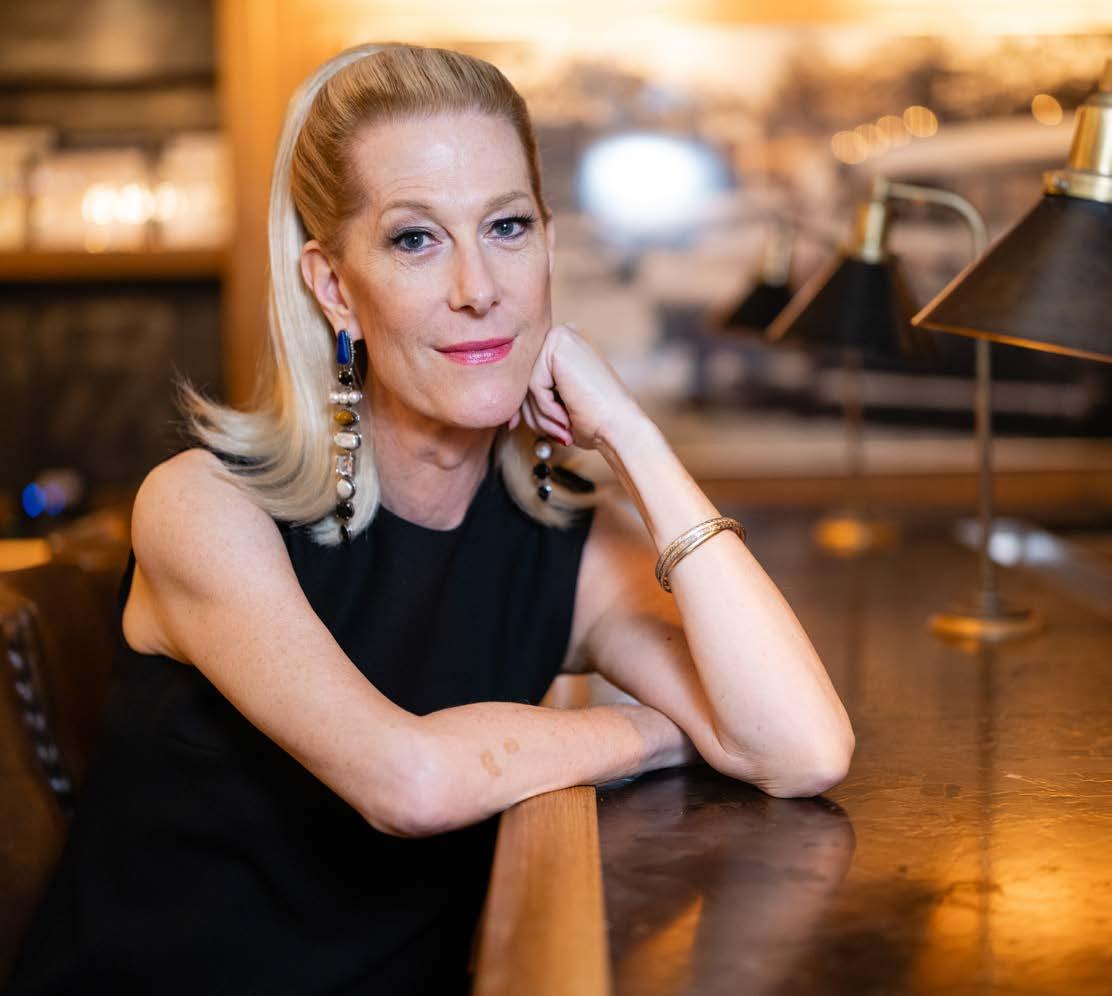
Pride kickoff
Asked to tally how many times they’ve graced the Feinstein’s stage, Bond said, “It’s my fourth year in a row, but I performed before COVID, and I’ve been back every June since then. Mine might’ve been the first show there after the lockdown, as a matter of fact.”
Bond added, “I love to kick off Pride Month
‘Queer
every year in San Francisco like this, because all my old friends can come to me.”
Not satisfied with multiple accomplishments, ranging from films and TV roles to books (V’s memoir “Tango: My Childhood Backwards and in High Heels” is a 2012 Lambda Literary award winner), and of course the hilariously dark performances as Kiki & Herb (with Kenny Mellman)
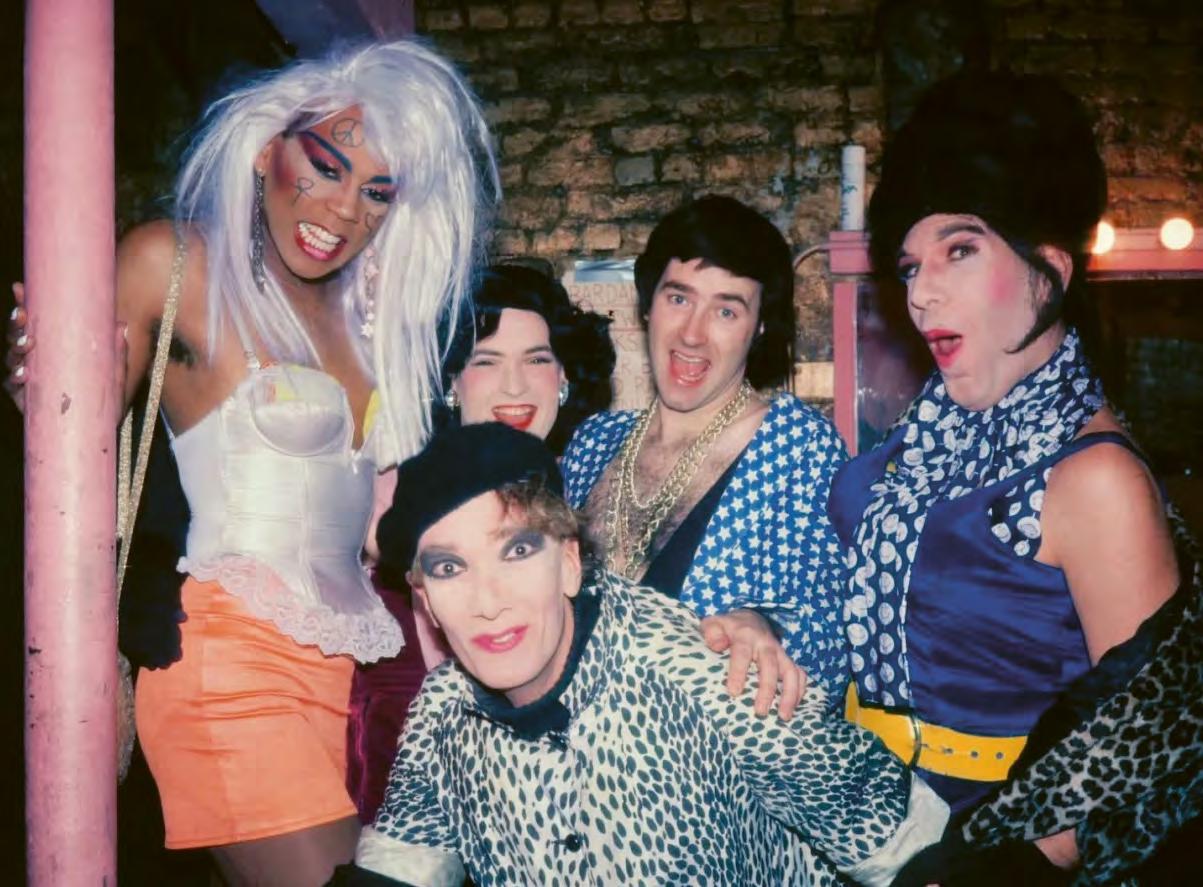

that earned a Tony nomination (and Obie and Bessie wins), Bond, 61, who was last year bestowed a MacArthur Genius Grant, is also delving into the world of opera.
“My friend Anthony Roth Costanzo, whom I recorded an album with, also did a show with
by Brandon Judell
It’s 4pm on a Thursday at Julius’ in the West Village, “the oldest continuously operating gay bar in New York City” according to Marc Zinaman’s newly released coffee-table book, “Queer Happened Here: 100 Years of NYC’s Landmark LGBTQ+ Places.”
If you were at Julius’ in the 1950s, you could have hobnobbed or more with the likes of Truman Capote, Tennessee Williams, and Edward Albee. Ah, the possibilities. Tidbits like this are only one of the many joys of encountering this newly released text.
A bigger sales pitch is that if you ever visited the Big Apple or lived there, “Queer Happened Here” will elicit memories of all the times you had to be checked for STDS, were splashed on by a careless popper user, or had your girlfriend break up with you five minutes before you were going to break up with her. But more on that later.
After ordering chicken nuggets while awaiting the author, I recalled Marlon Riggs once wrote, “Silence kills the soul; it diminishes its possibilities to rise and fly and explore. Silence withers what makes you human. The soul shrinks, until it’s nothing.” Fighting that shrinkage is the East-Coast-based Marc Zinaman who has just arrived. Since 2021,
17 >>
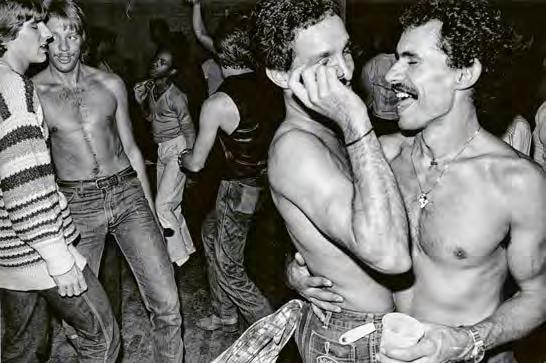
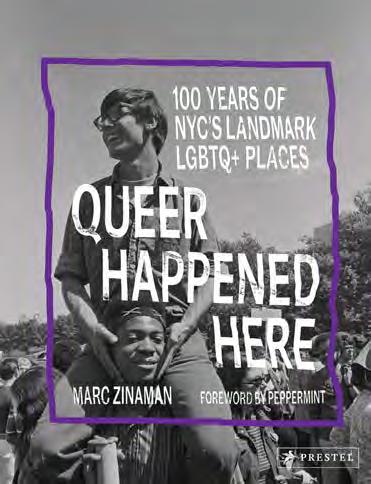
by David-Elijah Nahmod
Stephen Sondheim’s “Pacific Overtures” is one of the master songwriter’s most rarely performed works. The show begins in 1853 and tells the tale of how an isolationist Japan was westernized when American ships forcibly opened the country to the rest of the world. The story is told from the Japanese perspective, and focuses primarily on two friends who are caught up in their country’s change.
“Pacific Overtures” opened on Broadway in 1976, where it ran for six months and garnered ten Tony Award nominations. From May 30 to June 15, “Pacific Overtures” returns, this time at the Brava Theater in the Mission District.
This new staging comes to San Francisco courtesy of Kunoichi Productions, a collective consisting of Ai Eibashi, Keiko Shimosato Carreiro, and Nick Ishimaru, who is the director of the Brava production. The three of them have a simple goal, to produce works that speak to them as Japanese Americans.
Ishimaru, who is gay, and also performs in the show, hails from Colorado. He moved to San Francisco for graduate school in 2007 and has lived here ever since. Theater has been a huge part of his life ever since boyhood.
In an interview with the Bay Area Reporter, Ishimaru spoke about the story of “Pacific Overtures” and about Kabuki Theater, the classical form of Japanese theater which helped to inspire the show.
David-Elijah Nahmod: What is the basic story of “Pacific Overtures?” What themes does it explore?
Nick Ishimaru: “Pacific Overtures” tells the story of the forcing open of Japan by Commodore Matthew Calbraith Perry of the US Navy in 1853 by gunboat diplomacy in the first
me (the acclaimed “Only an Octave Apart”). He’s now the creative director of Opera Philadelphia. I had this idea for an opera called ‘Complications in Sue,’ in which the main character is Sue and the singers are all singing
Classic Sondheim musical comes to Brava Theater
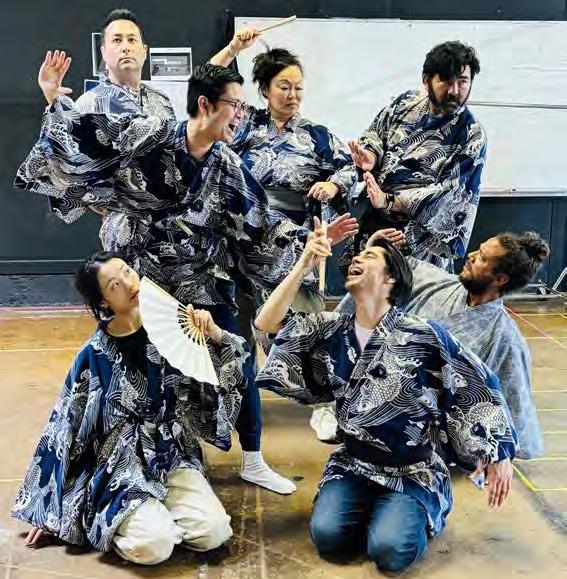
act to the collapse of Shogunate and the restoration of the Meiji Emperor in 1868. The events unfold from the Japanese perspective of three characters, Lord Abe Masahiro, the samurai Kayama Yesaemon, and fisherman John Manjiro.
The show explores profound and prescient Western themes like American imperialism and the aftermath of globalization. What I find most compelling through is how the show also incorporates themes from classical Japanese theater, like the opposition of giri and ninjo, or duty and personal feelings, which is central to Kabuki drama.
And finally, we’re framing this show as how we as children of the AAPI diaspora relate to and reconstruct our own ancestry.
what’s going on inside of her brain. So, I’m Sue, and it’s in ten sections. Each decade of Sue’s life has music by a different composer. But the libretto for the entire show is by Michael R. Jackson, who did “A Strange Loop,” and my costumes are going to be created by Jonathan Anderson.”
This is just one of many creative col-
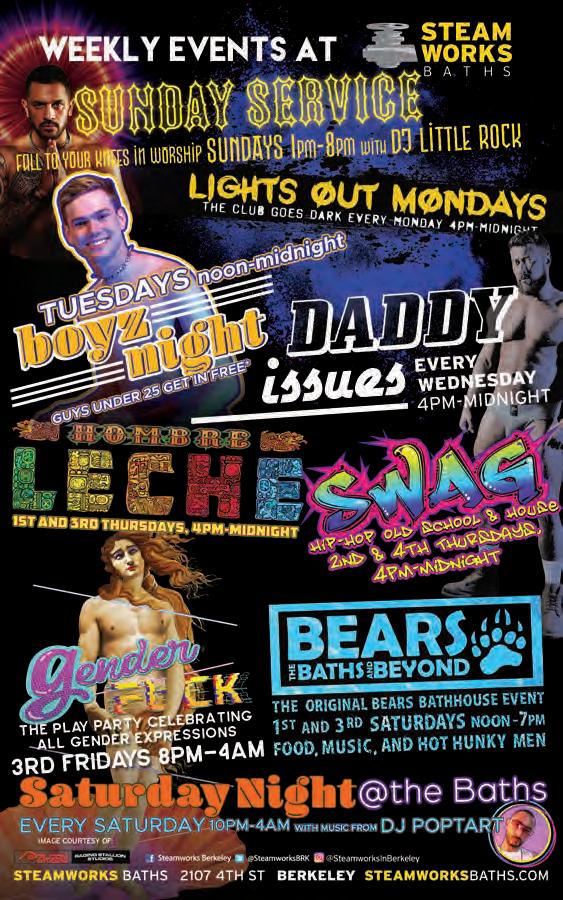
What drew you to want to direct a production of this show?
I’ve been working in musical theater for almost thirty years and traditional Japanese theater (Noh drama and Kyogen comedy) for just over fifteen years. Obviously, this show is more musical than classical Japanese theater, but this is one of the exceedingly rare opportunities to do both at once.
On top of that, it reflects how I as a fourth-generation Japanese American have had access to my ancestry, through a long distant Americanized lens, often only having fleeting glimpses of the homeland to connect to my lived experience.
What, in your opinion, is Stephen Sondheim’s legacy?
How elaborate will the production be?
The stage is a bit small, though it is quite tall, and the house is large. 360 seats make it one of the biggest houses in San Francisco. Overall, the designs are more minimalistic to emphasize the feeling of how we connect to our ancestry through half-remembered stories and old, faded images. But it’s still a full-sized production. The set is three levels and there are over 80 costumes on just ten actors. It might not have the elaborate painted backdrops of the full Broadway productions, but it’s as involved as any other full-scale production.
Will the show be performed with a full orchestra?
Why do you think “Pacific Overtures” is so rarely performed?
I believe “Pacific Overtures” is rarely performed for three reasons. One; on its face, the subject doesn’t seem like a likely source for gripping drama. It’s not as universal a story as Sondheim’s other works, so it’s not an obvious programming choice.
Two; the music is unbelievably difficult, even for a Sondheim show. The harmonies are tight and discordant. There are large moments of silence, which I believe is an interpretation of “ma,” or the Japanese concept of negative space.
Three; additionally, since this show is about Japan and features almost exclusively Japanese characters, it can be hard to cast this piece.
laborations in Bond’s busy schedule; make that Dr. Bond. Only days after our interview, Bond was bestowed an honorary Doctorate in Fine Arts at Bard College’s graduation ceremonies. Bond has taught, performed and curated programs at the upstate New York school for five years.
“My new cards are going to say ‘Dr. Justin Vivian Bond, Genius.’ And I ordered a stethoscope that’ll be decorated with crystals so that I can cosplay doctor with the right people!”
Jokes aside, Bond certainly has captured multiple opportunities for creativity.
“I’ve definitely kept myself doing fun and interesting things over the years,” said Bond. “I don’t know how it’s happened, but I’m very fortunate.”
Performance as activism
Of course, longtime local folks know Bond from early performances during their time in the Bay Area from 1988 to 1994.
“I became myself in San Francisco and I started performing in queer theater with Kate Bornstein’s play, ‘Hidden: A Gender,’ which was at Theater Rhinoceros,” they said. “And it was when I did that show that I realized I was just going to dedicate the rest of my life to queer performance and queer art. That was during the Queer Nation days, and I took it a heart.”
In an era when nightlife blended with activism, Bond became a local mainstay as the character Kiki DuRane began to emerge. Now, with an apartment in New York City, Bond also owns a house in upstate New York.
“When I curated performances at the Spiegeltent at Bard College, after five summers, I didn’t want to go back [to the city]. My cat didn’t want to go back, so I bought a house.”
Even domesticity can be a revolutionary act. As Bond says, “Glamour is resistance.”
In my opinion, Sondheim’s legacy is as the greatest musical theater writer of the latter half of the twentieth century. He wrote uniquely aesthetic music which explores concepts, rather than just actions or stories. It solidified musical theater as a form with depth and intellectual rigor that had previously been reserved for legitimate drama.
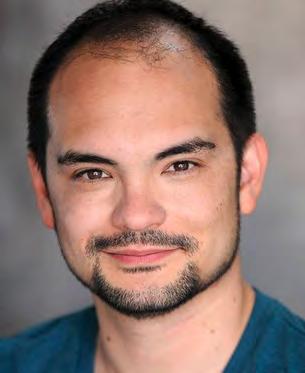
We have an eight-piece orchestra, including a shamisen. It’s not a full orchestra of eighteen pieces, but it’s more than a show played on a piano or prerecorded.
You have a dozen actors playing 50 roles. Are there any other creative changes?
People who really know “Pacific Overtures” might be expecting an all-male cast. To this day, professional kabuki is exclusively male, which Sondheim drew inspiration from for this piece. But I think there are excellent opportunities for nonmale voices in this show, so there are soprano and alto voices taking some of the big numbers. The soaring Gs in “There Is No Other Way” is particularly spine-chilling in the soprano voice. I promise audiences won’t be disappointed. t
‘Pacific Overtures,’ May 30-June 15, Brava Theater, 2781 24th St., 7:30 pm, Sundays, 2pm. $28.75-$79.75 www.brava.org www.kunoichiproductions.org
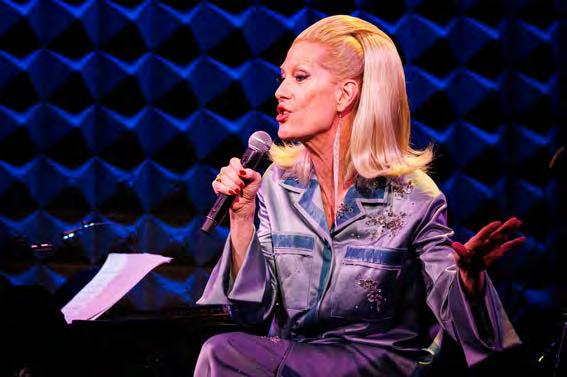
“I just considered everything I do to be activism, really,” Bond said. “I know it might sound pretentious, but when my neighbors asked if I was going to put up a Pride flag, I replied, ‘My house is pink, blue, and white. I don’t need to put up a flag. My house is a trans flag. I’m the parade.”
Although Bond has recorded several albums, EPs and group collections, it’s live performances that are more of a favorite outlet, like their decades-long residency at the Public Theatre’s Joe’s Pub. London fans can enjoy the return of Kiki and Herb July 3-5 at the SoHo Theatre Walthamstow, and V’s “Sex With Strangers” at the same venue July 11 and 12.
“I love singing, so I’m singing when I’m in the recording studio,” said Bond. “But I don’t get any pleasure out of the recording. Once it’s done, I’m not in the room with the audience who’s listening to it. Whereas when I perform, I’m in the room; we’re all communicating with the audience.
“I always say that the audience is my director because it’s an exchange of energy, and that creates something that’s much better than me alone or them
at home listening to my recording. There’s something magical about live performance. I mean, I’m glad other people make records.
“I talked to Tracy Thorn from Everything But the Girl, and I asked if she was going on tour with her new record. She said, ‘No, I don’t like singing in public.’ I never even thought of that. And she loves recording. She loves being in the studio. That’s her art. And mine is performing live.”
So, take advantage of the intimacy of Feinstein’s to once again enjoy our homegrown, now international star, Dr. Bond: Genius.
“I feel just as comfortable on the stage of Carnegie Hall as I do at Feinstein’s, because it’s still the same thing,” Bond concluded. “There are just more people. But I do enjoy the intimacy of Joe’s Pub and Feinstein’s because I can actually walk into the crowd and touch people, which I enjoy.”t
Justin Vivian Bond performs ‘Oh Well’ at Feinstein’s at the Nikko, 222 Mason St. June 5-7, $69-$91. www.feinsteinssf.com www.justinvivianbond.com

by Jim Gladstone
Playwright David Henry Hwang’s “Yellow Face” is currently running at Shotgun Players in Berkeley and on PBS’s Great Performances.
The Berkeley production is more impactful than the streaming version, a video capture of last year’s three-time Tony-nominated Broadway staging (The awards ceremony is June 8).
Alas that’s not flattery; it’s comparing flat to flatter.
Hwang’s semiautobiographical satire springboards off the controversy that followed British actor Jonathan Pryce, who is white, being cast as the Eurasian male lead in the original 1990 Broadway production of the musical “Miss Saigon.”
Hwang was among the community leaders who demanded that an AsianAmerican play the role. While Pryce did end up with the part, the debate amplified concerns about inequitable opportunity for minority theater artists that have both begun to be addressed and continued to grow more complex in the intervening decades.
Hwang’s script for “Yellow Face” touches on provocative social, moral, and aesthetic topics. But it frequently feels more like a self-aggrandizing ramble than an absorbing drama.
Constructed as a series of short black-out scenes that leave little room for character development or palpable emotion, “Yellow Face” renders complex ideas with the vitality and depth
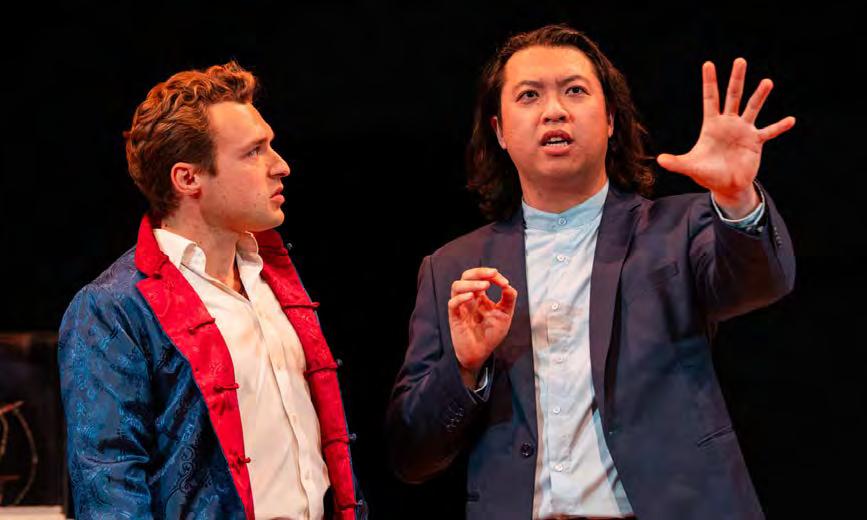
of a PowerPoint retrospective. While the imposition of a glassy screen further cools the effect of the PBS version, the in-person energy and agility of Shotgun Players’ cast, most of whom play multiple roles, manages to reach beyond the fourth wall enough to keep audiences engaged, if never enthralled.
Hybrid confusion
In addition to the alienating slide-
show click of its narrative, Hwang’s script combines docudrama and sheer fabulation with no discernible rationale. It leaves audiences puzzling over factual accuracy rather than encouraging them to focus on more resonant matters of identity and artistic freedom.
After spearheading the “Miss Saigon” protests, Hwang’s stage avatar, called DHH (Ben Chau-Chiu, believably blasé), inadvertently casts a white
by Jim Gladstone
The red-white-and-blue bunting and brass band music feel familiar as “Parade” begins with a Memorial Day gathering. But the banners on display suggest an ill wind blowing: They’re Confederate flags.
At the Orpheum Theatre through June 8, the touring revival of this 1998 musical by Jason Robert Brown (music and lyrics) and Alfred Uhry (book) feels uncomfortably timely.
In recent weeks, masked Proud Boys paraded briefly in Kansas City, white supremacists from abroad have been welcomed onto American soil, and Israeli embassy workers have been murdered in our nation’s capital.
In the Atlanta of 1915, where “Pa-
FABULOUS F**K BOY
Birthday Boy Jan 9. Hndsm hedonist. Model looks 6’ 150# 27yrs, 8” uncut beautiful tight yummy ass. Smoky sexuality erotic male nympho. Hndsm hedonist. Str8, gay, married men at yr apt, hotel, mansion! Greek god Nick 415-818-3126. Leather fetish fantasy roleplay kink dom sub group scenes mild to wild. Pretty boy with a dirty mind, romantic & unforgettable! $400/hr, $2000 overnight neg.
rade” is set, earnest tribute was still paid to southern soldiers lost in the Civil War, whites treated Blacks as lesser beings, and a Jewish factory owner was framed for the murder of a 13-year-old girl. The musical’s plot also incorporates political backstabbing, unabashed jury rigging, and the bereft families of innocent victims. “Annie” it ain’t. Tomorrow it could be.
Sustaining counterpoint
The real-life story of Leo Frank, who was not only convicted of a crime he didn’t commit but later kidnapped from his jail cell and killed by a lynch mob, is unlikely source material for a Broadway musical. But if you open your mind and approach “Parade” as if it’s an opera, it works surprisingly well.
Bookended by renditions of the folksong-influenced “The Old Red Hills of Home,” Brown’s dense and often dark score is brightened by underpinnings of Americana; a gospel theme here, a country twang there, glimmering like hope through the thick of it all.
Juxtaposing coercion, injustice, and unfathomable sorrow with gorgeously orchestrated music, Brown and arranger Daniel Felsenfeld allow us to stare into the abyss while simultaneously lifting us above it. There’s a sense of communion in the theater as the audience bears witness: “Parade” breaks you, but also builds solidarity. At a time when we have much to pray for, this is art as church.
Precise performances
There’s a fine-grained believability to the characters of Leo (Max Chernin) and his wife, Lucille (Talia Suskauer) thanks the actors’ perfor-

actor, Marcus Dahlman (William Brosnahan) as the Asian American lead in a play of his own.
He then covers up his error rather than correcting it, opening the door for Markus to become a celebrated community spokesperson. This fictional plot line is the show’s least credible element; it comes off more ridiculous than satirical.
The play also explores DHH’s sometimes awkward relationship with
his immigrant father. Like the real-life Henry Y. Hwang, HYH (Joseph Alvarado) achieves great success as an American banker, affording his son unusual privilege, only to have his Yankee Doodle delusions crushed by a Congressional financial corruption investigation politically motivated by anti-Chinese bias.
But instead of elevating the theme of a battered American Dream, the play hones in on details of the actual inquiry (already two decades past when “Yellow Face” premiered in 2007) along with those of the government’s subsequent, similarly prejudiced espionage accusations against Taiwanese-American scientist Wen Ho Lee. Hwang mires timeless topics in dated specificities.
Director Daniel Eslick and his cast of six do their best to enliven Hwang’s high-flown, low return cogitations, but the script leaves little breathing room. On Clint Sumalpong’s museum-like set, vitrines exhibit historic tokens of racism (including a portrait of Mickey Rooney as bucktoothed Mr. Yunioshi in “Breakfast at Tiffany’s”) and the actors don’t play flesh-and-blood characters so much as line-delivering animatronic figures. Hwang’s all-tooclever hall of precedents has little to say about the present or future.t
‘Yellow Face,’ through June 14. $23-$80. Shotgun Players’ Ashby Stage, 1901 Ashby Ave., Berkeley. www.shotgunplayers.org
The musical is tough stuff, but touched with transcendence
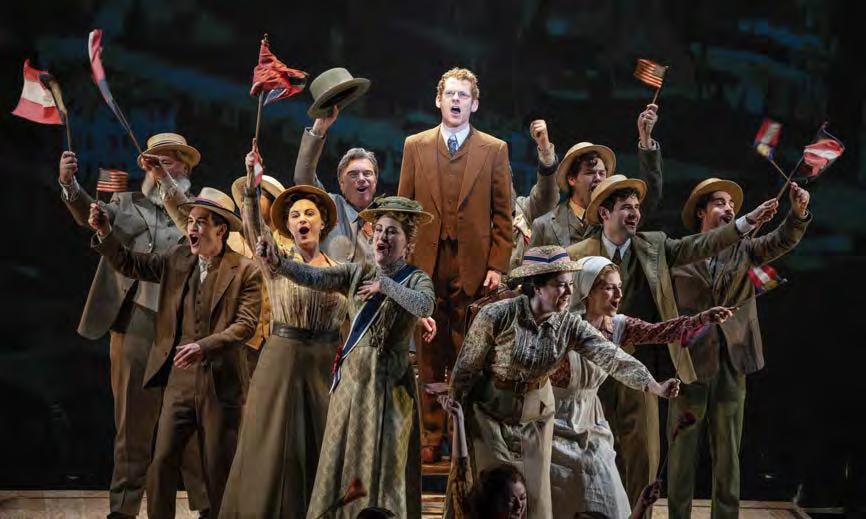
mances and Uhry’s writing. Rather than heroic figures, they’re just like us, ordinary people caught in the flagwaving whirlwind of an extraordinarily intolerant society.
Familiar down to their flaws, we hear them condescend to each other, catch bits of bickering, and note facial expressions that slip toward contempt. Yet there’s never a doubt that they’re devoted to each other. The show also has a few delightful, startling sexy bits.
Both leads sing beautifully. Suskauer in a soprano that transcends her character’s circumstance; Chernin in a rich, round, occasionally otherworldly bass. The supporting chorus is also top-notch and the secondary characters sharply etched. Griffin Binnicker gives a particularly strong performance as Tom Watson, a ruthlessly opportunistic conservative newspaper publisher. His character’s conniving would have made my skin crawl even if the actor didn’t bear a resemblance to J.D. Vance.t
‘Parade,’ through June 8. $58-$261. Orpheum Theatre, 1192 Market St. www.broadwaysf.com
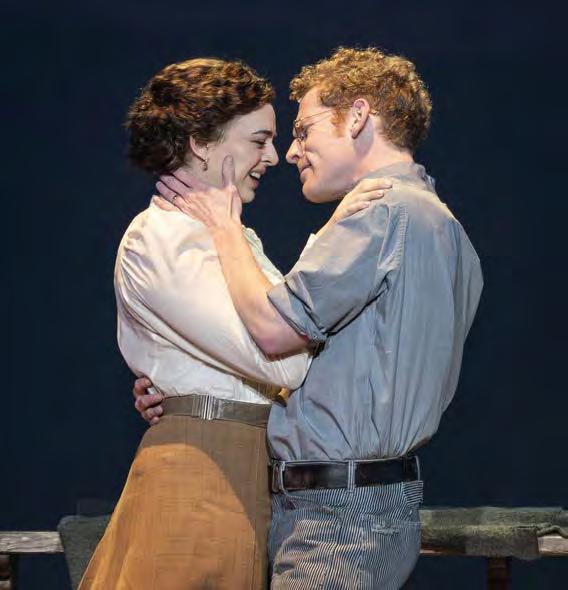

<< Queer Happened From page 13
he has been pulling together the social media account @Queer_Happened_ Here while contributing to other similar-goaled websites and serving on the planning committee for the forthcoming American LGBTQ+ Museum. His latest effort though will cost you $50, less on Amazon, and look quite festive on your nightstand.
Zinaman, your standard, attractively bearded homosexual in his 30s, is decked out with a black baseball cap, UNIQLO jeans, and white Converse sneaks. You at first might not have guessed that in front of you was one of the nation’s top queer bar-storians or disco-ologists. Or as he might insist, “plain old historian” will do.
Wed for three years to a lover he hooked up with on Bumble, the very congenial Zinaman notes that the heated romance has not at all infringed on his historical pursuits. In fact, on his Instagram and Substack accounts, Zinnaman has covered over 1000 gay venues, personalities, and consequential moments of modern LGBTQ history since tying the knot, focusing on the likes of the House of Xtravaganza, Quentin Crisp, and “the trailblazing African American singer and actress Ethel Waters.”
Dig into the past
So how and why does one start delving into the queer past full time?
“I came out at 18 in my first week of college,” Zinaman shared. “I went to NYU, which was very good because I had never really met other gay people before, and all of a sudden everyone around me was gay. That was also
when I started going out, which was in 2008. I grew up Orthodox Jewish in New York, so coming out familywise was, even though it was 2008, complicated. This was when I really started exploring.”
But most of the venues he’s reported on have long closed before his research began.
“Yes,” Zinaman nods. “There were a few still around when I started going out, but mostly they are all new. The interesting thing is that when I began to barhop, it was just when iPhones and all the tech that we now use all day, every day, was just starting to come out. That really wasn’t quite a thing yet, but definitely it was at the beginning of it. If you go to a bar now, everyone has their phone out, so that feels really different. In the same vein, not to equate it at all, but when I started to come out, there weren’t things like PrEP, which now new people coming out all are on.”
Consequential culture
But with no longer needing to spend his time in dives, Zinaman decided to cleverly distill our past in compact essays that are followed by encyclopedic entries on bars, dance halls, bath houses, eateries, and Pride marches. The most consequential moments of Manhattan’s LGBTQ history are recorded with hundreds of photographs of drag personalities, strippers on poles, bare male derrieres, and lesbians embracing.
See shirtless men sweating up the dance floor at The Saint, which was a “gay superclub” known as the “Vatican of disco” in the 1980s. Move a few pages ahead to the 1990s and observe leather-vested gals at the Clit

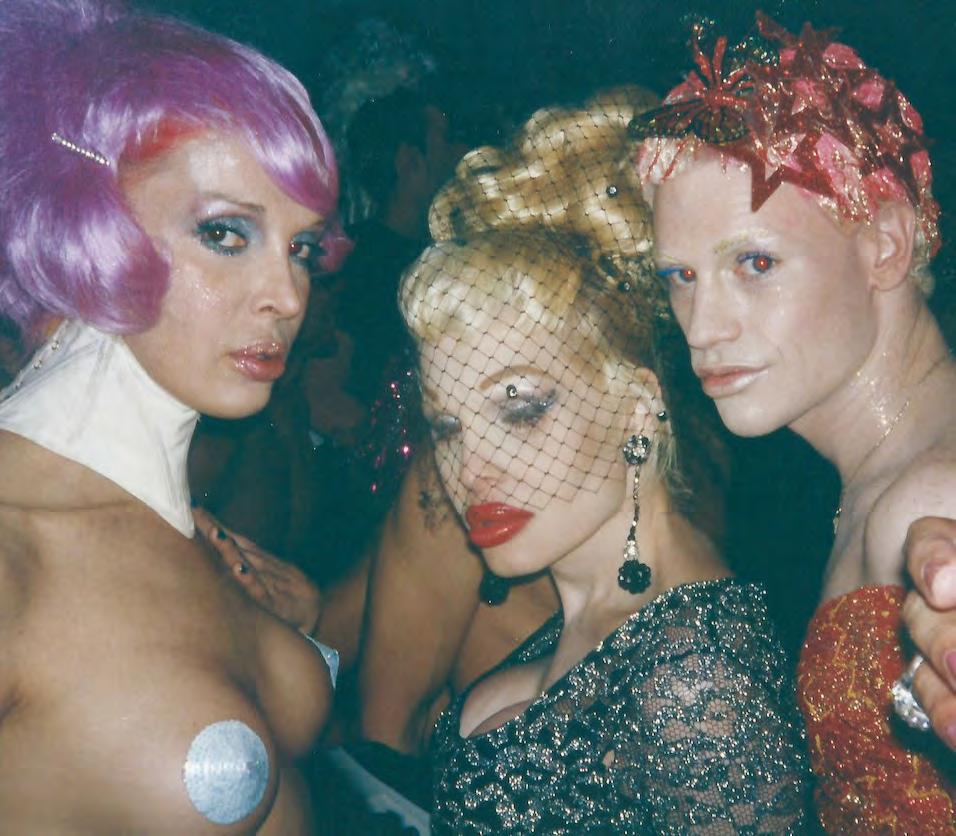
Club that was “conceived as a sexpositive, racially, generationally, and economically mixed space for lesbians, trans people, gays, and everyone in between.”
Prestel, the publisher of art books on Warhol, Banksy, and Art Nouveau, has supplied Zinaman with 304 pages to cite a selection of Manhattan locales and spotlight the often heavily mascaraed personae who peppered them from the Jazz Age onward.
Included are the Harlem-based nightclub Webster Hall in the 1920s that attracted the likes of Langston Hughes and Djuna Barnes, to the Crazy Horse Café in the 1960s that packed in mostly straight audiences with its female impersonation revues that featured takes on Eartha Kitt and Lena Horne.
Straights aside, Zinaman argued, “Still, [the Crazy Horse] served as an important gathering space for many queer people, providing an opportunity to bring joy to others and explore gender identities.”
The final entry of the book opened its doors in 2017. Welcome to actor Alan Cumming’s Club Cumming, where there is a weekly knitting circle titled “Stitch and Bitch.”
But besides the encyclopedic text recording the Ballroom Boom, the birth of early gay rights organizations, and the emergence of AIDS, what really threw Zinaman for a loop during his research period?
“What jarred me in history? When I was 18 or 21, I didn’t have a good idea, but I have a good idea of queer history now. Especially, it’s still really fascinat-
ing now to read about the Mafia involvement and how long that lasted, how without the Mafia, gay places wouldn’t have really existed before Gay Pride.”
Yes, without a Godfather or two, there might never have been a Stonewall, and a hundred other bars, and today there might not have been any gay rights to dismantle. Thanks to “Queer Was Here,” we can never look at lasagna the same way.t
‘Queer Happened Here: 100 Years of NYC’s Landmark LGBTQ+ Places,’ by Marc Zinaman, $50, Prestel/Penguin/Random House www.penguinrandomhouse.com www.instagram.com/ queer_happened_here/

by Laura Moreno
The remarkable new short story collection by Yukio Mishima, “Voices of the Fallen Heroes and Other Stories” is newly translated and published 55 years after his very public death in 1970. Never before published in English, the collection consists of 14 short stories. They were written in the 1960s and yet seem tailor-made for today.
Mishima’s impact on Japanese literature is profound. He was nominated for a Nobel Prize in literature five times, but never won. His razorsharp prose centers around Japanese history and aesthetics even as it grapples with Japan’s identity after its catastrophic defeat in WWII, the resulting collective trauma, homoeroticism, male intimacy, and the struggle between the individual and society, tradition and modernity.
As always, Mishima delves into the depths of the human experience, forcing readers to confront the darker aspects of life. But he intersperses moments of humor and playful banter into his writing as well.
Regarding his personal life, Mishima had an unusual upbringing. His grandmother took him to live with her and did not let him to go into the sun, play sports, or have friends. The only companions permitted were female cousins and their dolls. After returning to his family at age 12, his father would raid the boy’s room in search of books and writings, which were considered effeminate. At age 16
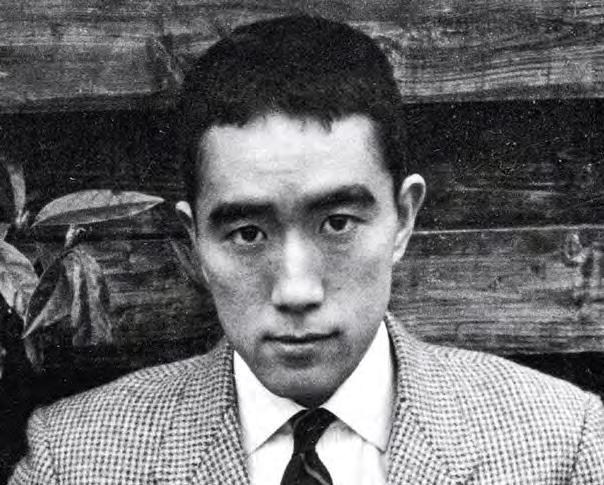
when a literary magazine published his writing, they gave him the name we know him by, a pen name, to shield him from his father’s ire.
Whispers from the battlefield Released this year by Penguin Random House on the 100th anniversary of his birth, “Voices of the Fallen Heroes and Other Stories” is the culmination of the exhaustive research that is evident in all his work, making it valuable historical literature today even though it was written not as history but in the tradition of postmodernist literature.
Whether set in the lush landscape of rural Japan or in the fast-paced city,

his stories resonate with an intensity that makes them indelible. His short stories appear to have been hurriedly written as if to placate some impulse that arose while working on more substantive projects.
“The Dragon Flute” is set in military barracks after a long day as a “tall and fit” soldier plays a Japanese flute. He plays a folk song about a prince so gentle-looking and handsome he had to wear a mask into battle. The song transports the author to a time when warriors set out to be both fierce and delicate according to Shinto tradition.
“From the Wilderness” is the unembellished telling of a crazed fan who broke into Mishima’s house in real life,
imploring the writer to meet and “tell him the truth.” It reads more like news than a literary work.
“Voices of the Fallen Heroes,” the last story in the collection, confronts the ghosts of the past when a séance conjures the angry spirits of deceased Japanese officers and kamikaze pilots.
Unafraid to challenge the prevailing narratives, the chilling tale is an exploration of identity, desire and loss in a time when the Japanese public felt it was losing more than it could bear in becoming a “rootless country.”
Warrior culture in the Shinto tradition features prominently in Mishima’s work and life. Shinto, Japan’s ancient indigenous religion, against all
odds, remains its dominant religion today. Buddhism is a close second. It was Shinto philosophy, much like the Norse mythology of the inner circle of Germany’s Nazi party, in fact, that led up to Japan’s ill-fated conquest of China in WWII which thrust it head on into ultimate defeat. Shinto and Norse mythology made sense in the past when each tribe was on its own and had to constantly guard against surprise attacks. But transcendence into ultimate truth is much better encapsulated by the peaceful, life-affirming teachings of Buddha or Jesus.
But people perish for lack of knowledge. Mishima founded the Tatenokai (“Shield Society”), a private army, in 1968 to restore the emperor and act as a counter-weight to the excesses of Japan’s commercialism.
Mishima’s untimely death at age 45 was as dramatic as his writing. In 1970, the author led his group of men in a failed takeover of a local military outpost, then ended his own life in an elaborate Samurai ritual leaving a great deal of writing for a young man: 34 novels, 35 books of essays, 50 plays, an opera libretto, a film script, and 25 short story collections. “Voices of the Fallen Heroes” is the 26th.
In the end, Yukio Mishima remains a complex and controversial figure worth studying.t
“Voices of the Fallen Heroes and Other Stories” by Yukio Mishma, Penguin Random House, $17. www.penguinrandomhouse.com
by Tim Pfaff
Areader coming fresh to Tash Aw’s new novel, “The South” (Farrar, Straus and Giroux), even one familiar with his four previous, award-winning novels, would profit from a word of explanation. It’s the story of a Malaysian family in the immediate aftermath of the 1997 region-wide financial crisis brought on by massive Thai real estate corruption.
They’re returning, these members of the Lim family, or at any rate some of them, to an old plot of family land south of Kuala Lumpur, the “South” of the somewhat cryptic title, to make some tough determinations about the farm’s economic viability. The chances of that are as slim as these poor people,
and the goal of the young ones is to get out of Dodge.
Gradually, over the course of the novel, the reader begins to assemble the pieces of narrative out of what at first seem almost incongruous plot elements. Vagaries as to how things are going at any particular point are easily attributable to the fractured nature of family interactions anywhere.
There are even pointers to the financial shenanigans elsewhere that overnight changed the lives of people throughout Southeast Asia profoundly and for the worse. They woke up to half the money they thought they had when they went to bed.
But if sometimes “The South” is as hard a place for a reader to get grounding as it is for the family on their farm,
there is a reason. “The South” is intended as the first novel in a four-part saga. Nothing in the volume you hold in your hand says that, but in this case, what isn’t there is arguably as important as what is.
I read the book without knowing that and frequently wondered why there was such a glut of story, from multiple points of view, such a large revolving cast of characters. Understanding that “The South” is part of a larger literary enterprise makes all the difference. If it’s intermittently baffling, it’s because the author is laying down the series’ expository material.
The gay elements
a gay “type,” a gay guy you might find anywhere in the world.
His memories about childhood sports shame are precious.
“Team sports were the most confusing part of school for me, and football was the activity I dreaded the most. I panicked every time I saw the ball rolling toward me, trying not to recoil in terror, as though it carried with it some kind of contagious disease.”
For many gay readers, this passage will require no further explanation. But Aw works with it, and works it.
on their sides to avoid touching each other. Why this charade, when all they both want to do is precisely to reach out and touch the body lying next to them? At least Jay was.”
But when Chuan takes an active role in their intimacy, it feels sudden, abrupt, the way it can in real life, despite Jay’s protracted longing. Aw writes their sex credibly but never luridly.

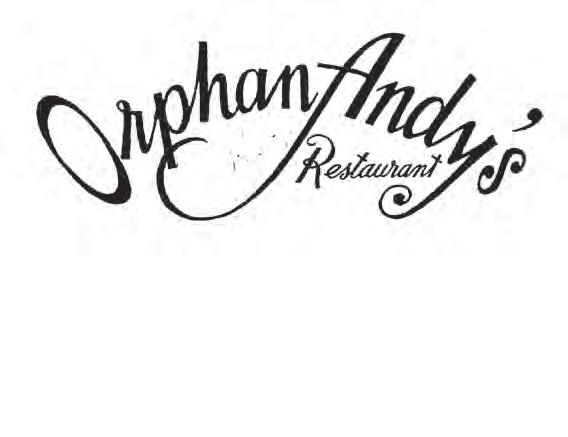
Characterizing this novel as the boys’ story, their slowly budding passion, isn’t wrong. That relationship will certainly keep gay readers on board, but it’s helpful to know that theirs is not the only story –the beating heart of this novel, to be sure, but only part of the action. But this is rural Malaysia in hard times, so the chances of a happy ending are significantly curtailed.
Even at its most elliptical, the writing is absorbing. But what makes it constantly challenging is its frequent shifts of time frames and points of view. The individual stories are interleaved in a thick tapestry, which can lead to a sense of passing confusion and a desire on the reader’s part to stay with, or promptly get back to, the gay understory.

One of the book’s most elevated passages –and salient metaphors– is Jay chasing a stray ball at the demand of his teammates, which leads him to another kind of oasis, an open area secluded by tall weeds. There he finds a group of boys being themselves, which is to say playing their own games, some of them sexual. The reader is not surprised when Jay returns to the glen to reconnect with the boys only to find them gone but the space now provisionally his.
Aw is especially good at conveying complex stories and intertwining themes in language of startling directness.
One reasonably hopes that future volumes will bring more, that “The South” is not the last time.t

Jay, our protagonist, tells most of the story, sometimes but not always in the first-person. Western readers will find him the easiest character to understand. He’s just short of being

What makes the love story both so individual and so typical is that it is only gradual on the part of Chuan.
“There is not enough space on the bed for two of them to lie down on their backs, so they have to stretch out
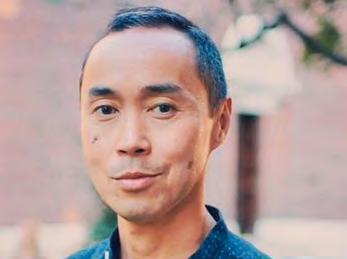
Tash Aw, ‘The South,’ $28, 280 pp., Farrar, Straus and Giroux www.fsgbooks.com www.instagram.com/tash.aw
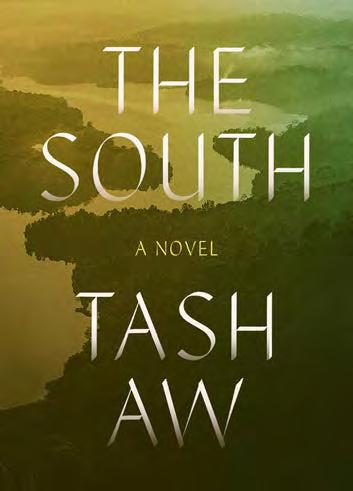
by Gregg Shapiro
Iair
Said, the writer, director, and star of the queer Argentinian movie
“Most People Die on Sundays” (Big World Pictures), deserves our admiration. In 72 minutes, he makes us run the gamut of emotions, sometimes in the same scene.
When we first encounter overweight gay man David (Said), he is in a hotel room, on the opposite side of a closed bathroom door, desperately pleading with his boyfriend not to leave him. The next thing you see is David leaving, with two toothbrushes, dragging a suitcase through the sand at the beach before going for a swim.
A grad student studying abroad, David is a sad sack with complicated needs. His preparations for a flight home to Buenos Aires are one example. Once he lands, he’s met by his sister Elisa (Juliana Gattas), and they begin discussing their Uncle Poncho’s upcoming funeral.
Elisa wanted David to be there to support his mother Dora (Rita Cortese) and Poncho’s sister Aunt Silvia (Antonia Zegers). David’s comatose
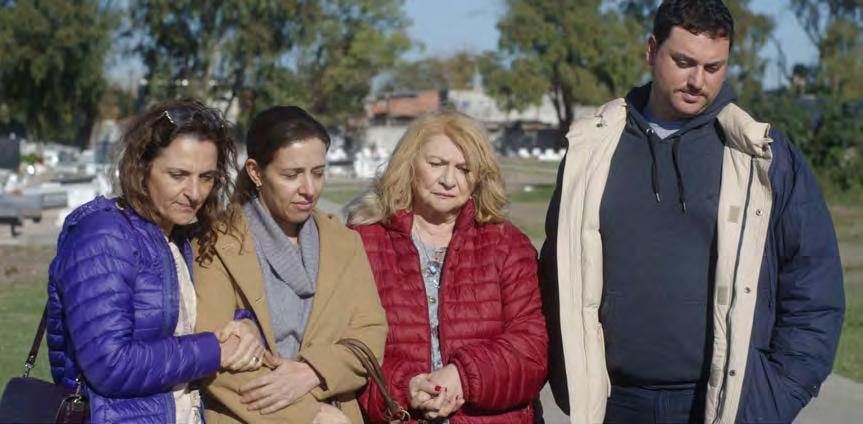
father Bernardo (Mario Bodega) has been hospitalized for months, and David thinks the relatives at the funeral treated him and Elisa as if they were the next ones to suffer a loss.
David also has an insatiable sexual appetite. He doesn’t have a driver’s li-
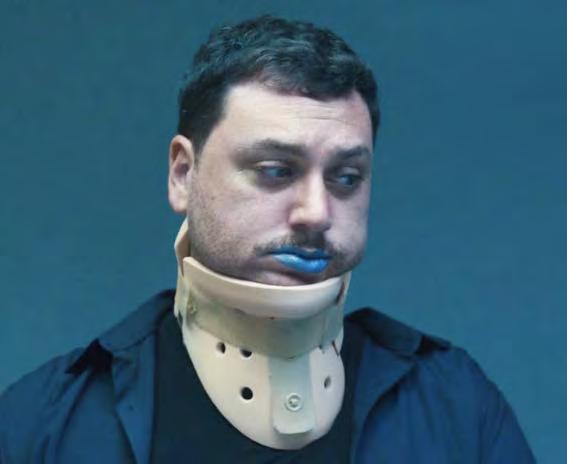
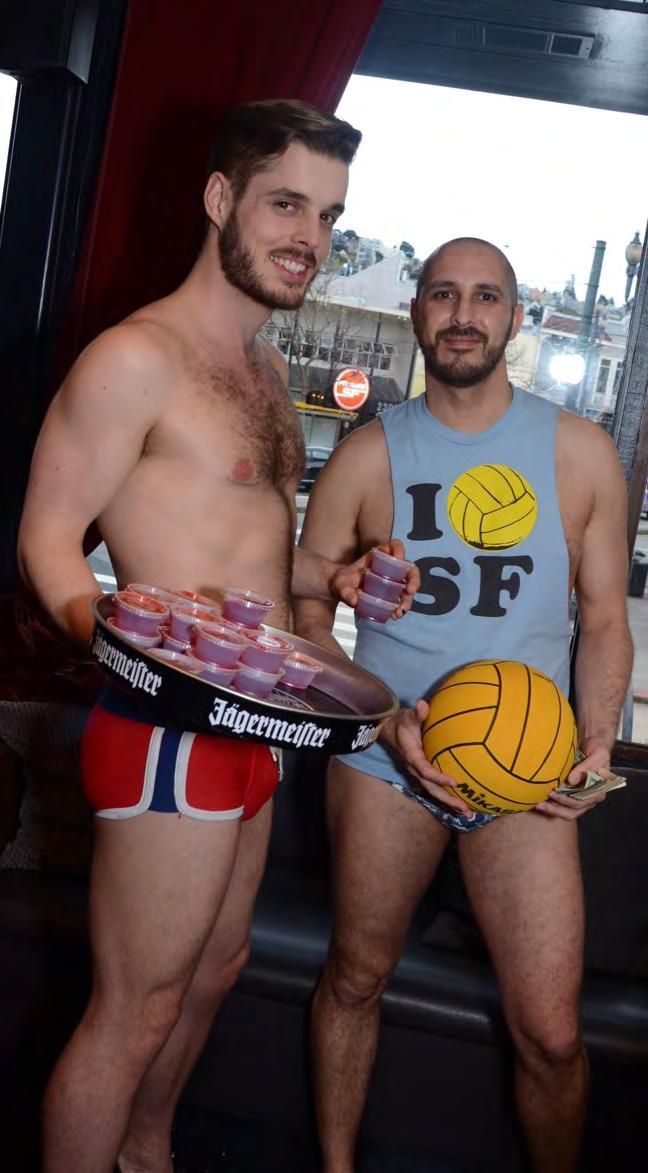
cense, and during a driving lesson he attempts to kiss the male driving instructor and is rebuffed, twice. To hit on his mother’s hot next-door neighbor, he intentionally locks himself out
of her apartment, in his underwear, no less, so he can knock on the neighbor’s door and ask to use his phone.
He also cruises a doctor at the clinic where his father is receiving care, even
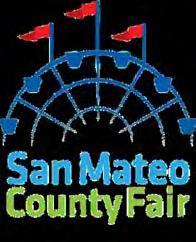
going so far as to follow him into the bathroom. For the record, nothing comes of David’s clumsy attempts at connection.
Home in time to observe Passover with his family (and celebrate his niece’s birthday), David manages to keep himself in check. Following the seder, David and a gay cousin head off to a party, which results in him crashing his mother’s car and injuring his neck. It’s one of a string of uncomfortable events, including Dora’s sprained ankle, an awkward voicemail message David sends his ex, the difficult decision to take Bernardo off life support, and bizarre negotiations at a fast-food drive-thru, that might possibly remind some viewers of early Almodóvar.
But Said is not Almodóvar and vice versa. Said is his own original filmmaker and I, for one, look forward to seeing more from him; in Spanish with English subtitles. Rating: Bwww.bigworldpictures.org
